China
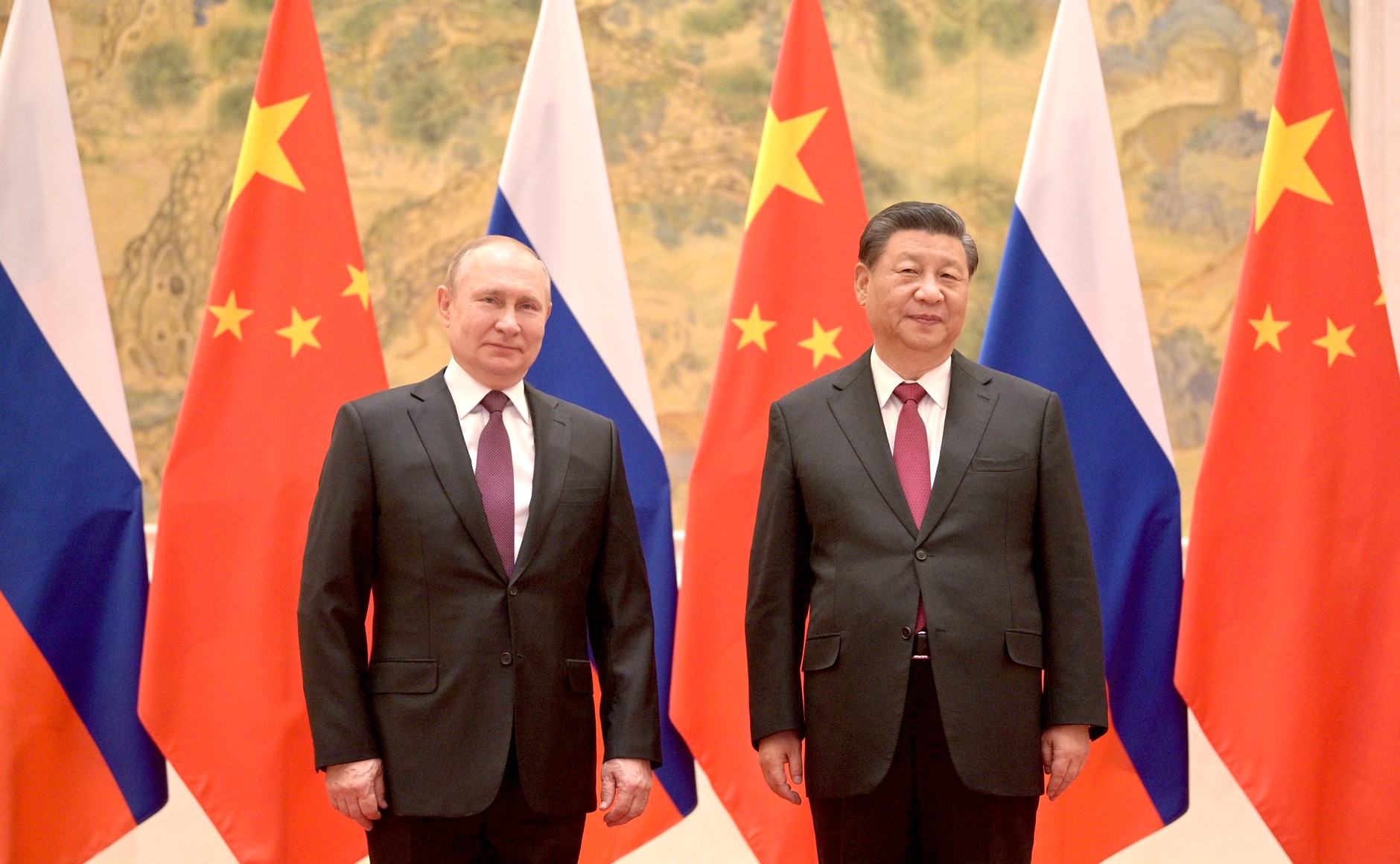 natoassociation.ca
natoassociation.ca
cross-posted from: https://feddit.org/post/3877004 > Russia has had to cope with an almost systematic increase in sanctions in scope and scale in order to conduct its invasion of Ukraine. These sanctions aim to hobble Russia’s capacity to procure and produce the necessary products to resupply its military. However, while sanctions have significantly affected Russia’s economy and war effort, Russia has shown adaptability in circumventing these restrictions through various initiatives and engaging with strategic partners, most importantly, the People’s Republic of China and its business entities. > > [...] > > A study by the KSE Institute utilizing Harmonized System (HS) codes [...] analyses forty-five common high-priority items (i.e., battlefield goods) and 485 HS codes for critical components [...] Between January and October 2023, Russian imports of battlefield goods totalled $8.77 billion, while critical components amounted to $22.23 billion. Within the 2023 KSE Institute compiled dataset, China has exercised a pivotal role in Russia’s efforts to import battlefield goods and critical components for its military and defence industry. This is observed from the immediate aftermath of Western sanctions being imposed to August-December 2022 when imports of battlefield goods and critical components increased by 84% and 42% respectively. > > [...] > > China was instrumental in all stages of the Russian defence industry’s external supply chain between January and October 2023. For instance, where businesses are headquartered, China accounts for 41% of battlefield goods and 41.2% of critical components. Interestingly, the total non-coalition sanctions accounted for 48%, and of these, China represented 46.7%, making China the most dominant power outside the coalition-sanction countries and the most dominant single entity. > > China’s role increases substantially during manufacturing, representing 63.1% of battlefield goods and 58.7% of critical components produced for Russia. > > [...] > > Data shows that Chinese and Hong Kongese companies’ data combined led the sales of the goods and components in question to Russia, accounting for 68.9% of battlefield goods and 57% of critical components. Finally, China also plays a pivotal role in goods and components shipped directly to Russia, with China representing 53.2% of battlefield goods and 53.8% of critical components, respectively. Again, China is followed by Hong Kong at 22.7% and 12.9, with a combined 75.9% and 66.7%. > > [...] > > Specific Chinese exports of dual-use components and materials related to Russia’s defence industry and equipment that is being utilized by Russia’s military, including construction equipment, comprises: > > - Computer Numerical Control (CNC) machines > - Semiconductors > - Microelectronics and Electronic Components > - Ball Bearings > - Nitrocellulose > - Drones and Electronic Warfare systems > - Body armour and Helmets > > [...] > > China’s continued support for Russia amid its invasion of Ukraine poses significant risks and challenges that far outweigh any short-term benefits. By aiding Russia, China jeopardizes its international reputation as a responsible global power, becoming a complicit actor in the conflict, violating international law and the core principles of sovereignty. > > Moreover, Chinese entities supporting Russia and the Chinese government’s lackadaisical response to Western complaints will eventually lead to secondary sanctions, deepening economic strains and retaliation from Western nations. > > [...]
**China's National Health Commission (NHC) is surveying 30,000 people to understand factors influencing their attitudes towards childbearing and the "fear surrounding having children", as authorities struggle to boost a flagging birthrate.** The survey will include people from 150 counties in China and 1,500 different communities, the state-backed Global Times said late on Thursday, citing the China Population and Development Research Center, which falls under the NHC [The Global Times framed its story under the headline 'National population survey launched to help optimize fertility support'.] Beijing is trying to encourage young couples to have children after China posted a second consecutive year of population decline in 2023. The survey aims to analyse "reluctance and fear surrounding having children" and ultimately provide fertility support and incentive measures, the newspaper said. The last time a countrywide family and fertility survey was carried out was in 2021. It comes after China's National Bureau of Statistics said it will conduct a nationwide sample survey from Oct. 10-Nov. 30 to monitor population changes. Population development has often been linked to a strong and rejuvenated China in state media. Chinese health officials said in September they would focus more efforts on advocating marriage and childbirth at "appropriate ages" and called for shared parenting responsibilities to guide young people towards "positive perspectives on marriage, childbirth and family". [Edit typo.]
 www.telegraph.co.uk
www.telegraph.co.uk
[Archived link](https://web.archive.org/web/20241007054452/https://www.telegraph.co.uk/world-news/2024/10/05/xi-and-mao-replace-jesus-and-mary-in-chinese-churches/) The sudden order to remove the symbol of the cross from the roof and entrance of a village church in China’s Anhui province cited unspecified “safety” hazards. The notice, issued in March, was a shock to the church in Yongqing, eastern China, which had reportedly passed official safety inspections for the cross on the roof five years ago. The second cross had stood at the door of the church for over 40 years without any security concerns. [...] Nicola Smith Asia Correspondent. Jenny Pan Related Topics Xi Jinping, China, Christianity, Religion 05 October 2024 2:00pm BST 98 Worshippers in a Roman Catholic church in China Worshippers in a Roman Catholic church in China Sally and Richard Greenhill/Alamy Stock Photo The sudden order to remove the symbol of the cross from the roof and entrance of a village church in China’s Anhui province cited unspecified “safety” hazards. The notice, issued in March, was a shock to the church in Yongqing, eastern China, which had reportedly passed official safety inspections for the cross on the roof five years ago. The second cross had stood at the door of the church for over 40 years without any security concerns. ChinaAid, a US-based group that advocates for religious freedom in China, alleged the order had been made by the villagers’ committee with no legal basis, suggesting it may have originated with higher-level authorities who wanted to avoid international criticism. Party slogans and censorship It was one of multiple examples of oppression cited in a report last week by the United States Commission on International Religious Freedom (USCIRF), an agency that reviews violations of religious freedoms overseas and makes policy recommendations to the President and Congress. In their effort to “exert total control” over religion and to “sinicise” Catholic and Protestant Christianity, the authorities have “ordered the removal of crosses from churches [and] replaced images of Jesus Christ or the Virgin Mary with pictures of President Xi Jinping,” the report said. The Chinese government has also required “the display of CCP [Chinese Communist Party] slogans at the entrances of churches, censored religious texts, imposed CCP-approved religious materials, and instructed clergy to preach CCP ideology,” the USCIRF report said. Its investigation pointed to a report from 2019 of a Catholic church in the eastern province of Jiangxi that was forced to replace a painting of the Virgin Mary with her child with one of President Xi. [...]
 www.theguardian.com
www.theguardian.com
cross-posted from: https://feddit.org/post/3885525 > Taiwan is expected to have access to low earth orbit satellite internet service by the end of the month, a step the government says is crucial in case a Chinese attack cripples the island’s communications. > > The forthcoming service is via a contract between Taiwan’s main telecoms company, Chunghwa, and a UK-European company, Eutelsat OneWeb, signed last year, and marks a new milestone in Taiwan’s efforts to address technological vulnerabilities, particularly its internet access, after attempts to get access to Elon Musk’s Starlink service collapsed. > > Chunghwa co-president Alex Chien said 24-hour coverage was expected by the end of the month, with commercial access as soon as sufficient bandwidth was reached. > > Taiwan is under the threat of attack or invasion by China, which claims historical sovereignty over Taiwan and has vowed to annex it, by military force if necessary. In the meantime it is under a near constant barrage of cyber-attacks, and has had some of its 15 undersea cables connecting it and its outer islands to the world cut multiple times, usually by accidental anchor snags from passing ships.
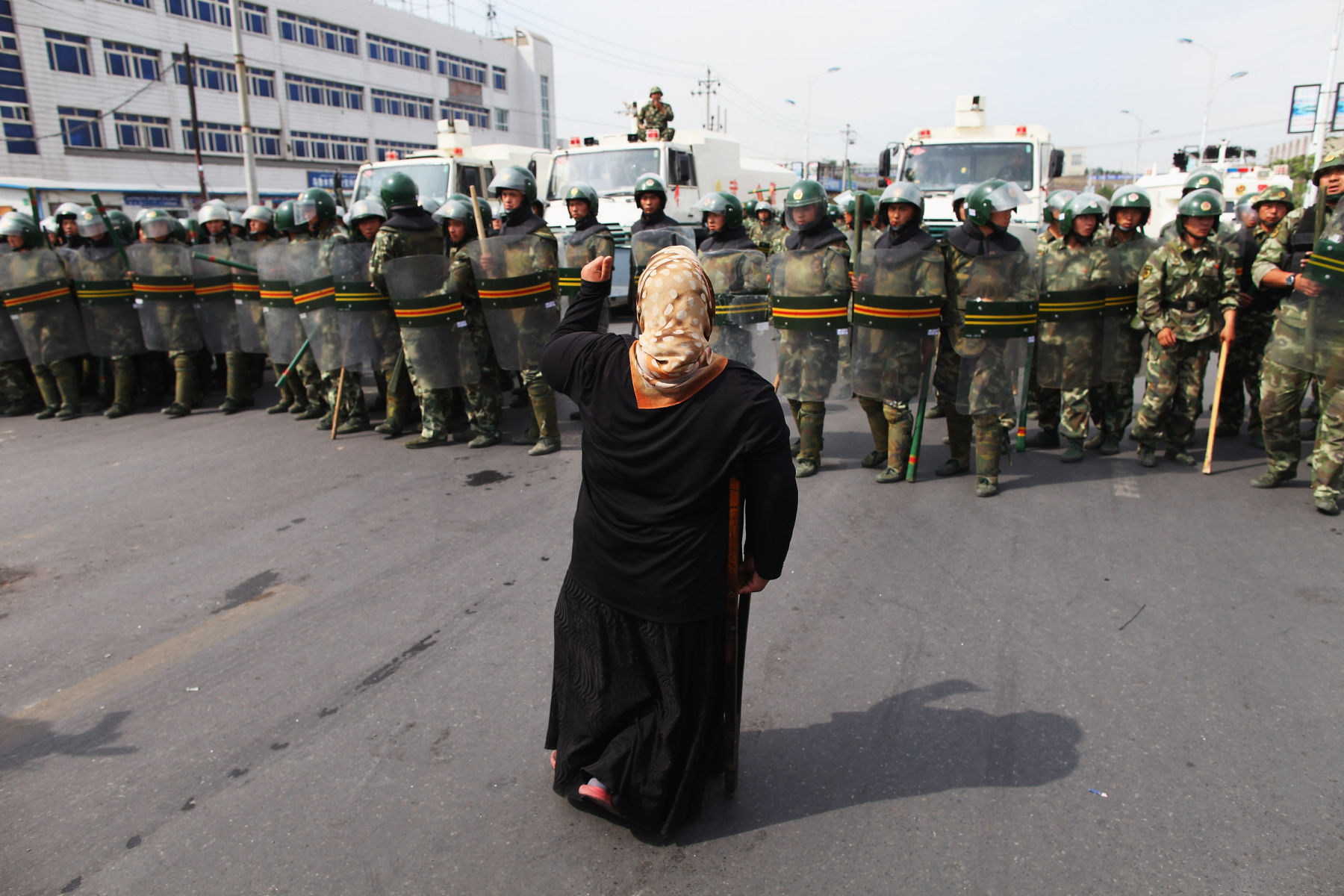 dawnmena.org
dawnmena.org
cross-posted from: https://feddit.org/post/3823927 > **"The dehumanization of Palestinians and the collective punishment they endure from Israel's war in Gaza have shattered the very fabric of their society, much like what China has inflicted upon my people," writes exiled Uyghur human rights lawyer Rayhan Asat.** > > The Palestinian mother watching a bulldozer tear through her house reminds me of every Uyghur mother whose home was invaded by Chinese forces. The rubble of schools and mosques destroyed in Gaza takes me back to my homeland, where the oldest shrines have been leveled, and our teachers handed life sentences. The surveillance system China tested against the Uyghurs has been exported to the streets of occupied Hebron. As Israeli settlers flood the West Bank with the full support of Israel's government, I'm reminded of the millions of Han people that China brought into my homeland, where they receive special privileges in an apartheid system the world has ignored for decades. > > [...] > > Israeli atrocities in Gaza, and the intentional blocking of humanitarian aid that has led to starvation and the spread of polio in the besieged territory, have sparked global outrage, especially among young people. However, this same level of outrage has not been directed toward China's systematic efforts to slowly eradicate the Uyghur people in its prison camps. Some argue that the differing reactions are due to America's direct support for Israel's war in Gaza, but victims do not suffer less because of the identity of their perpetrator. If human rights are truly universal, then what happens in Gaza and Xinjiang should equally outrage us all.
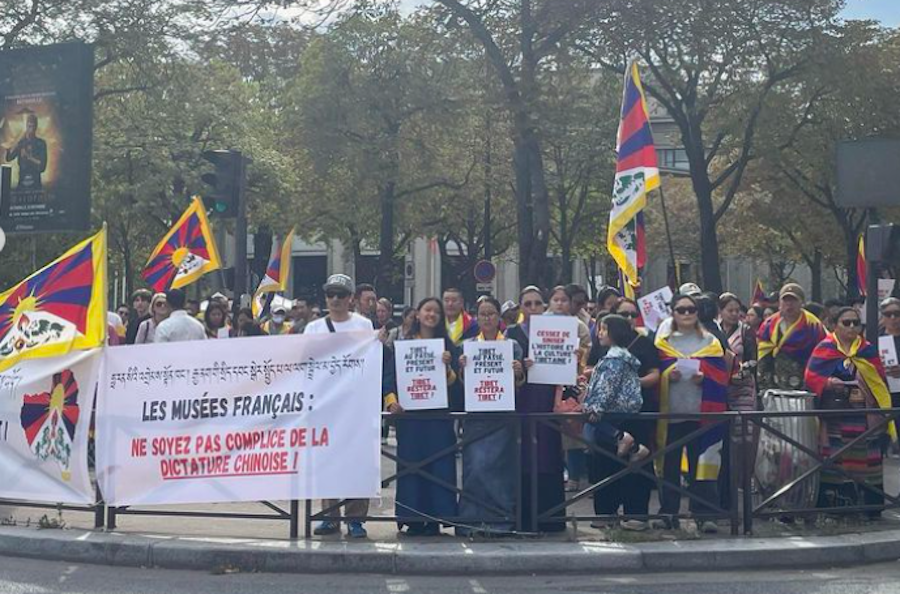 www.phayul.com
www.phayul.com
cross-posted from: https://feddit.org/post/3784578 > **Tibetans and Tibet supporters in the French capital are continuing their protests against the Musée Guimet, despite the museum’s recent decision not to rename exhibitor spaces as “Tibet” rather than “Himalayan world. While the Musée du quai Branly apologised and promised, on September 25, to restore the name “Tibet” with the romanised version of a Chinese term, “Xizang” on its artefacts. ** > > For weeks, members of the Tibetan diaspora, human rights activists, and Students for a Free Tibet (SFT), a chapter-based network of youth activists, have gathered outside the Musée Guimet, demanding the recognition of Tibet as a distinct cultural and historical entity. Protesters chanted slogans such as “Tibet Exists. Name It.” and “Shame on Guimet,” calling on the museum to honor Tibetan heritage by renaming the exhibition halls to reflect Tibet’s true identity. > > [...] > > Despite the peaceful demonstrations, museum officials have rejected the appeal, stating that the name change was part of a broader global framework and that Tibet continues to be mentioned within the museum’s exhibits. > > “Many researchers and experts in the field have also expressed their disagreement with this renaming and the invisibilisation of Tibet that it entails,” said Tenzin Yangchen, President of SFT France, speaking on behalf of the Tibetan community. “Their opposition underlines the importance of maintaining historical and cultural integrity in our academic and museum institutions. That is why we cannot remain silent.” > > Yangchen also emphasised that the issue at the Guimet Museum is just one example of the increasing Chinese influence in France. “For decades, the Tibetan people have suffered under the oppression of the Chinese government. We cannot remain silent in the face of this injustice that now extends to our own cultural institutions.” She added that the protests would continue for as long as necessary until the Guimet Museum acknowledges Tibet as a nation with its own identity, culture, and artistic heritage. The activists are also stepping up efforts to engage with local politicians and government officials to press for change. > > [...] > > The controversy gained public attention when Le Monde raised concerns that the Musée du Quai Branly had replaced “Tibet” with “Xizang Autonomous Region,” and the Musée Guimet had renamed its exhibition spaces focused on Tibet as the “Himalayan world.” Scholars argue that these changes align with Chinese state propaganda, which aims to rewrite and distort Tibetan history and culture, ultimately legitimising China’s illegal occupation of Tibet.
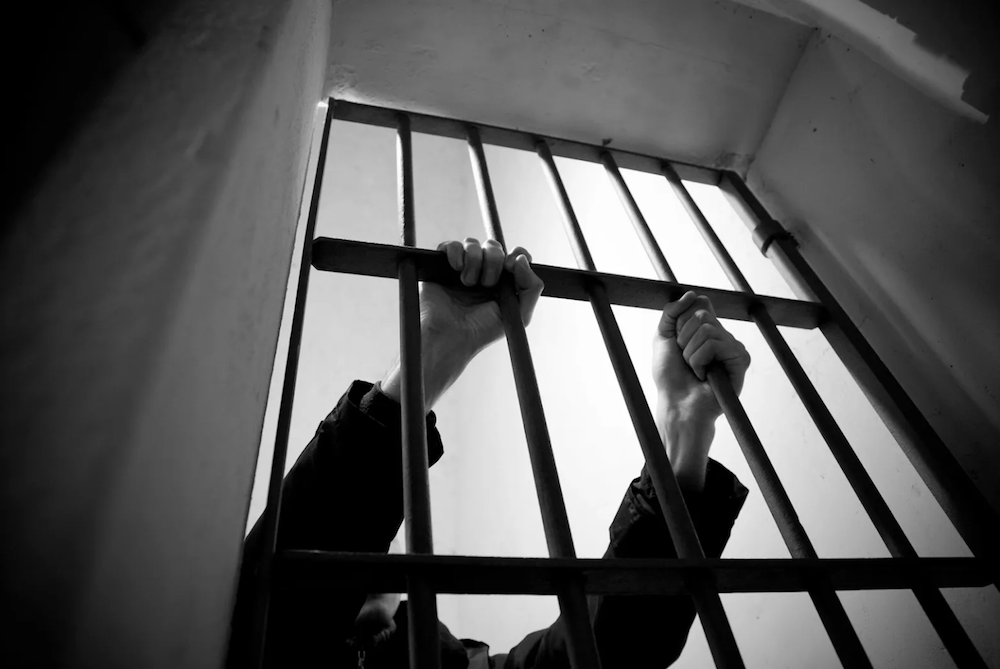 www.phayul.com
www.phayul.com
Chinese authorities have forcibly detained four Tibetan students, aged 15 to 18, for refusing to attend a state-run boarding school following the closure of the Buddhist primary school at Taktsang Lhamo Kirti Monastery in Dzoge County, according to a report by Radio Free Asia. The students have been subjected to “political education” as part of the government’s efforts to enforce attendance at state-run institutions. The Taktsang Lhamo Kirti Monastery School was shut down on October 1, coinciding with China’s National Day celebrations. **On October 2, authorities forced more than 200 students, aged 15 to 18, to attend state-run schools in Dzoge County as part of China’s compulsory education policy, marking the complete closure of the monastery school. Starting in July, over 300 younger students, aged 6 to 14, had already been forcibly transferred to various state-run schools in the county.** [...] The forcibly enrolled young monks are being educated primarily through Chinese textbooks. However, they are also receiving separate political education sessions focused on Chinese politics and ‘Xi Jinping’s Thought,’ according to an anonymous source inside Tibet. [...]
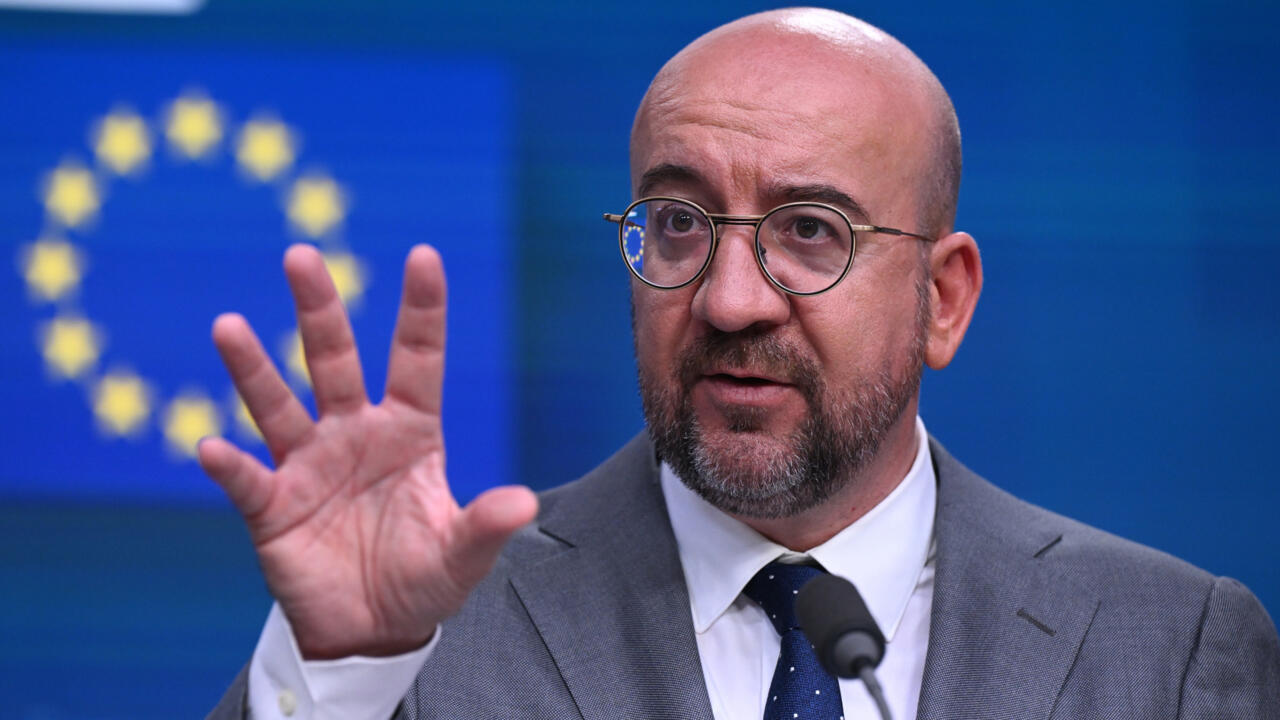 www.france24.com
www.france24.com
cross-posted from: https://feddit.org/post/3816102 > The European Council president met Chinese Premier Li Qiang on the margins of a Southeast Asian summit in Laos as Beijing and the European Union impose tit-for-tat penalties on each other's imports in a row about subsidies and protectionism. > > Michel said in an interview with AFP that after his "frank and candid" talks with Li, he hoped a deal could be struck in the coming days or weeks -- but he warned that getting there would be tough. > > [...] > > "We count on China to adapt its behaviour and to understand that we have to rebalance the economic relationships for more fairness, for fair competition, for a more level playing field." > > [...] > > A furious Beijing has responded with new tariffs on EU-made brandy, alarming French producers, while Brussels is also investigating Chinese subsidies for solar panels and wind turbines. > > China is also tangled in a bitter, wide-ranging trade dispute with the United States, with Washington announcing sharp tariff hikes targeting $18 billion of Chinese goods including electric vehicles, EV batteries and solar cells. > > Beijing reacted angrily to Michel's remarks Friday, condemning what it called the EU's "lose-lose" approach to the dispute. > > [...] > > With the global economy rattled by conflict in Ukraine and fresh turmoil in the Middle East, Michel said it was better for all to avoid a trade war. > > But he insisted the EU would no longer be "naive" about massive government subsidies, though he offered some hope the two sides would find a way out of the row. > > [...]
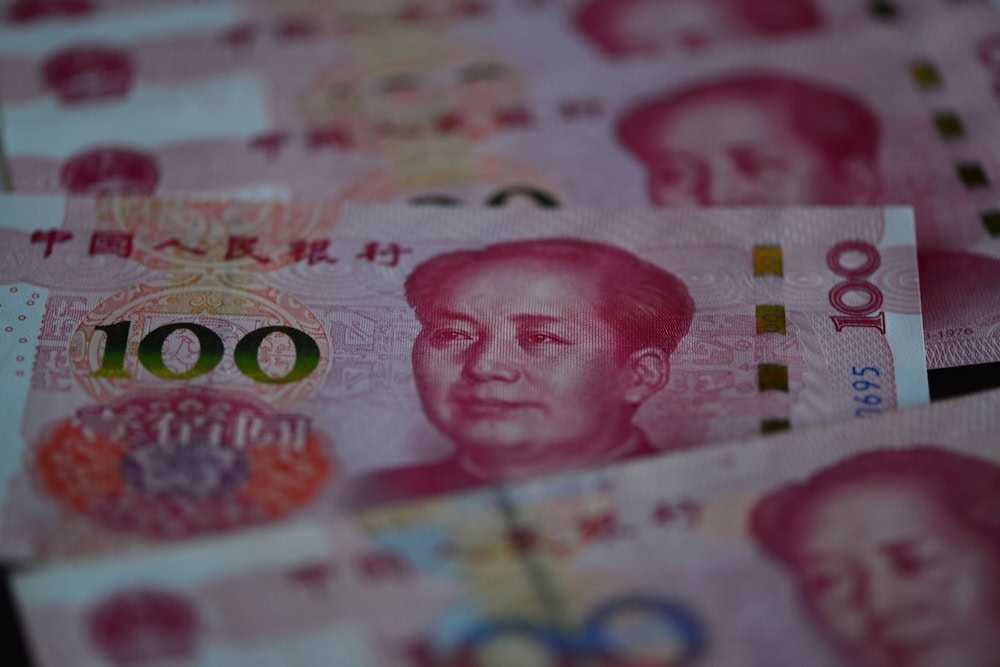 ifex.org
ifex.org
[Archived link](https://web.archive.org/web/20241007022831/https://ifex.org/the-boomerang-effect-of-beijings-economic-censorship/) [...] While censorship on economic issues is hardly new, the level of repression has taken a darker turn of late, sending chills through anyone in the country who analyzes the economy as part of their profession. The most extreme example is the reported disappearance of Zhu Hengpeng, one of China’s most prominent and well-connected economists. Zhu is a director at the Chinese Academy of Social Sciences (CASS), a leading think tank that reports directly to the cabinet. [...] He is believed to have been forcibly disappeared in April after he made disparaging remarks about the economy in a private chat group on the Chinese social media platform WeChat. The specifics of what Zhu said are unclear, but some reports indicate that he had “improperly discussed central policies” and made a reference to the “mortality” of Chinese Communist Party (CCP) leader Xi Jinping. [...] While economic information is perceived as being less politically sensitive than discussions about democracy or human rights in China, [...] research shows that over the past decade, the CCP has repeatedly ratcheted up restrictions whenever the economy appears to be in trouble. This year, the crackdown has increasingly focused on content that addresses income inequality, youth employment, and poverty – in other words, deep-rooted problems that affect large swaths of the population and could undermine a key pillar of the CCP’s political legitimacy. [...] Chinese citizens are also prohibited from expressing their feelings about the economy. In February, WeChat removed a popular article that reported on survey findings from the Guangzhou-based Canton Public Opinion Research Center, which revealed a prevailing sense of pessimism about the country’s economic well-being. Around the same time, the CCP’s flagship mouthpiece People’s Daily published an article titled “The Whole Country Is Filled with Optimism,” attempting to project positivity online. Netizens immediately flooded the social media platform Weibo with posts ridiculing the article. Within hours, the hashtag being used to discuss the piece was removed from public view. [...] information on the economy is a daily concern for almost everyone in China. Tight censorship on this topic can breed mass distrust in approved sources and compel more netizens to circumvent the CCP’s draconian internet censorship, despite the possibility of punishment, in search of more objective news and analysis on China’s economic situation. In other words, censorship on the economy could ultimately backfire on censorship in general, exposing the regime to an even greater crisis of legitimacy.
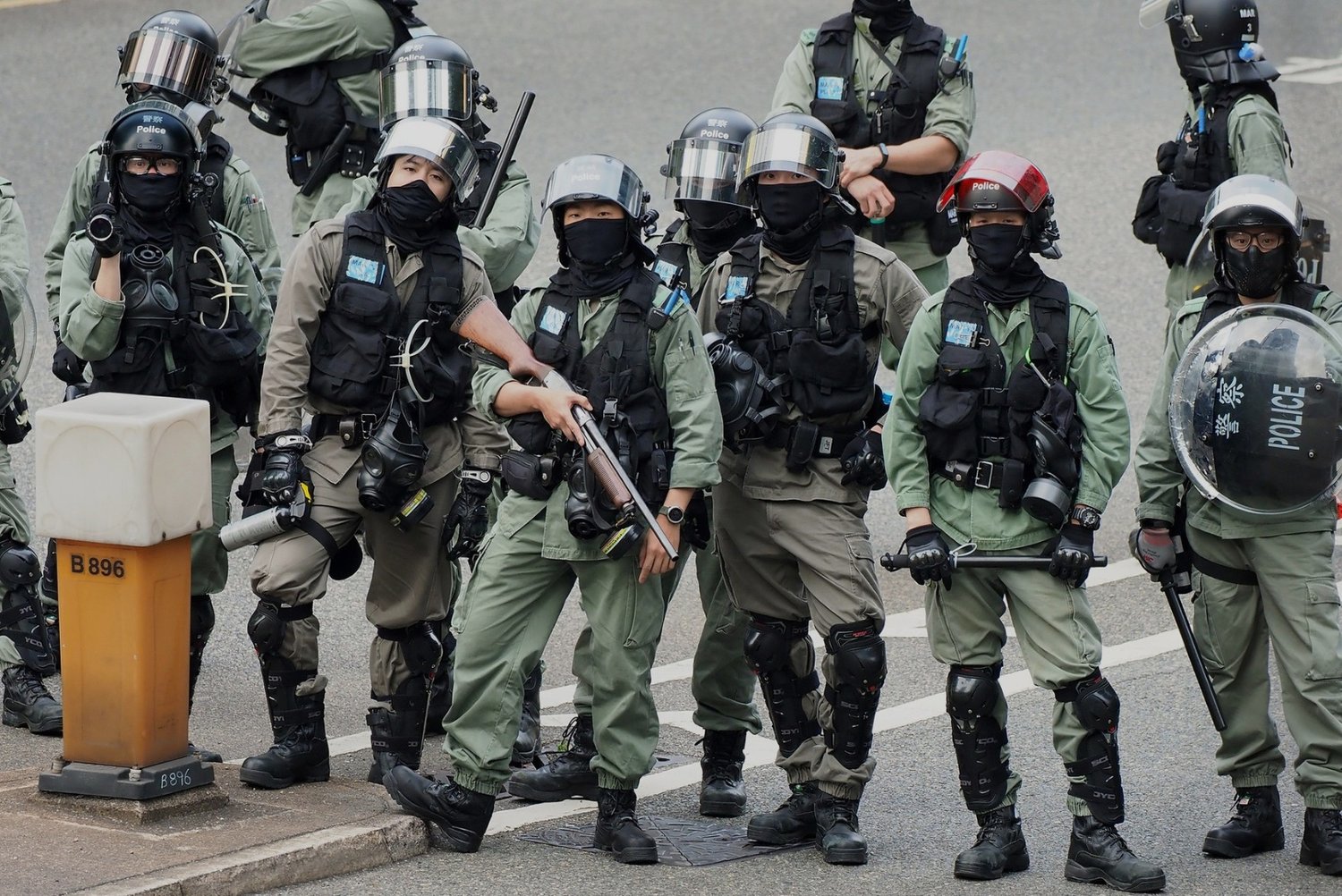 www.9dashline.com
www.9dashline.com
cross-posted from: https://feddit.org/post/3784522 > In March 2024, the Hong Kong government introduced a new security law, the Safeguarding National Security Ordinance. Also known as ‘Article 23 legislation’, it exacerbates the impact of the 2020 National Security Law by introducing a number of new crimes and longer sentences for existing crimes. Practically speaking, the two pieces of legislation are complementary legal tools for cracking down on dissent since the 2019 pro-democracy protest movement. > > [...] > > EU governments should advocate for the rules-based international order and the upholding of international law; principles which are enshrined in the Treaty of Lisbon, EU institutions, and across domestic policies and legislation. While it is not perfect, the EU stands for fundamental rights and freedoms, which it seeks to promote at home and abroad. Furthermore, speaking out about human rights violations in Hong Kong and China is a clear way of reiterating those values in the face of Beijing’s quest to reshape international human rights norms and language. This is particularly important when Beijing’s actions have an impact within the EU itself. > > **Intimidation and division among Hong Kongers in the EU** > > In July and December 2023, the Hong Kong government issued arrest warrants and HKD 1 million (USD 128,100) bounties, under the 2020 National Security Law, for 13 activists based in the UK, US, and Australia. All these individuals reside outside Hong Kong and China and several hold foreign citizenship. Most recently, in June 2024, the Hong Kong government cancelled the passports of six activists based in the UK. Article 96 of the new Safeguarding National Security Ordinance allows for the cancellation of “absconders” passports, enacted in this instance. Exemplified by the government’s latest round of threats against activists abroad, these measures constitute an innovative new type of transnational repression against Hong Kong citizens. > > [...] > > Novel threats from the Hong Kong government are already causing real consequences for Hong Kongers in the EU — activists and more ‘ordinary’ citizens alike — and they are creating new challenges for advocacy from both the civil society and diplomatic channels. > > [...] > > The arrest warrants, bounties, and now passport cancellations, show that Hong Kong (and China) is entering uncharted territory in its transnational repression and violations of international law. The Hong Kong Economic and Trade Office (HKETO) has also been used in similar ways. > > [...] > > Although none of these repressive measures have been employed against European citizens or residents so far, they send a signal to Hong Kongers based in the EU that these actions can be used against them too. More broadly, they signal that the Hong Kong government (and Beijing) can take extraterritorial action with little consequences. **This is a test to measure the international response: if they can do this with little accountability, they know that they can commit further harassment, and other forms of human rights violations, abroad.** This is noted by other undemocratic countries, who may be inspired by this impunity and consider forms of extraterritorial human rights violations they can commit themselves. Thus, a strong pre-emptive response is vital to deter extraterritorial human rights violations against people in the EU. > > [...] > > Strategically, EU member states should adopt a more consistent and unified approach towards China, particularly its violations of international human rights law and the rules-based international order. > > [...] > > Furthermore, China and Hong Kong need to be held accountable and face real consequences for their human rights violations and violations of international law. **This could include targeted sanctions against key government officials and entities, trade restrictions on items that support the Hong Kong government’s oppression,** and legal challenges at international courts. [Edit typo.]
 www.bbc.com
www.bbc.com
For years, posts related to events during World War Two have proliferated on the Chinese internet, with the Japanese invasion during the war remaining a sensitive topic for nationalists on both sides. In China, Japan’s wartime atrocities have long been a sore point as Beijing maintains that Tokyo has never fully apologised. The online posts are part of a wider phenomenon, which encompasses both xenophobia and attacks on Chinese nationals for being unpatriotic. One argument by analysts is that this digital nationalism has gone mostly unchecked by the Chinese government, with online patriotism fanning flames of anti-foreigner sentiment as well as accusations against Chinese figures. Some are asking if this has gone too far. [...]They see echoes of the violent, state-sponsored campaign against so-called enemies of the Chinese Communist Party (CCP) that traumatised the country in the 1960 and 1970s. Hundreds of thousands died in purges often led by youth militias known as the Red Guards. Families and neighbours turned on each other. In a recent essay, author and university professor Zhang Sheng noted that “in the past people summoned the Red Guards, now people summon the ‘little pinks’” – a popular nickname for the virtual army of online nationalists. [...] It is not just foreigners facing the ire of cyber-nationalists. In recent months, Chinese public figures and companies have also been castigated for being insufficiently patriotic. Beverage giant Nongfu Spring is considered a Chinese business success story, with its mineral water bottles a ubiquitous sight across the country’s convenience stores and restaurant tables. But in March, nationalists accused the company of using Japanese elements in its product design. One of its logos was said to resemble a Shinto temple, while the iconic mineral water bottle’s red cap was deemed to be a reference to the Japanese flag. It resulted in a brief but intense online campaign: some called for a boycott, while videos of people angrily stamping on Nongfu Spring bottles and chucking their drinks down the toilet were all over social media. Similarly, the author and Nobel Literature Prize laureate Mo Yan was accused of “beautifying” Japanese soldiers and being unpatriotic in his works by a nationalist blogger, who controversially sued the writer for insulting China. [...] Even state media has accused online nationalists of “making patriotism a business”. One commentary by CCP mouthpiece People’s Daily said those who “stir up public opinion and add fuel to the flames in order to… gain traffic and make personal gains, should be severely punished”. But the ruling party has had a hand in stoking the fire, some say.
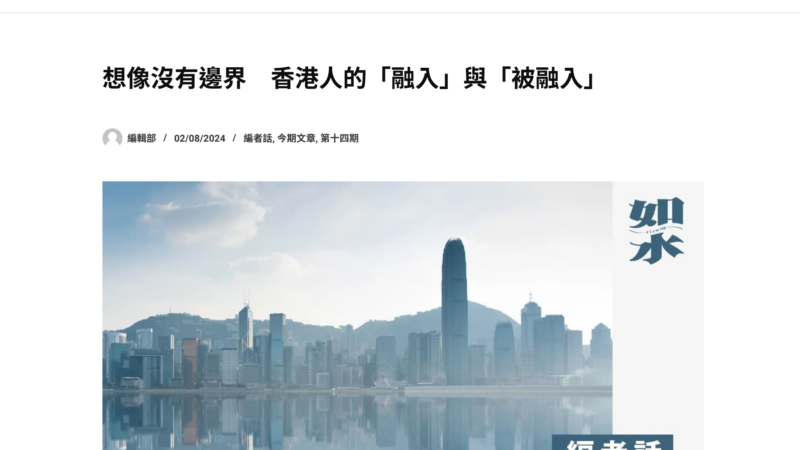 globalvoices.org
globalvoices.org
A US web-hosting company has been issued a notice by Hong Kong police asking it to take down the website of Flow HK, a media outlet co-founded by pro-democracy activists who have left the city, on national security grounds. Automattic, the company behind web content management system WordPress, told HKFP on October 7 2024 that it had received a take-down demand from Hong Kong authorities relating to the website of Flow HK. The company said it had not complied with the order and had notified the site owner. In an emailed reply to HKFP, Sunny Cheung — one of the co-founders of Flow HK — said Hong Kong police had said the outlet was suspected of violating a national security law imposed by Beijing in 2020 and a separate security law enacted in March, the Safeguarding National Security Ordinance, known locally as Article 23. Cheung said police suspected Flow HK of committing offences including secession, subversion, and collusion under the Beijing-imposed security law, as well as sedition under Article 23. [...] Flow HK was founded in early 2021. According to its mission written in Chinese on the website, the publication aims to connect the Hong Kong diaspora and “pass on the torch of resistance.” Other editorial members include wanted activist Ray Wong, an ex-leader of political group Hong Kong Indigenous who was granted political asylum in Germany in 2018, as well as digital rights activist Glacier Kwong, who also lives in Germany. [Edit typo.]
 edition.cnn.com
edition.cnn.com
Though it consistently ranks among the world’s safest big cities, police in the Asian financial hub say the new cameras are needed to fight crime – and have raised the possibility of equipping them with powerful facial recognition and artificial intelligence tools. That’s sparked alarm among some experts who see it as taking Hong Kong one step closer to the pervasive surveillance systems of mainland China, warning of the technology’s repressive potential. Hong Kong police had previously set a target of installing 2,000 new surveillance cameras this year, and potentially more than that each subsequent year. The force plans to eventually introduce facial recognition to these cameras, security chief Chris Tang told local media in July – adding that police could use AI in the future to track down suspects. [...] Hong Kong police have repeatedly pointed to other jurisdictions, including Western democracies, that also make wide use of surveillance cameras for law enforcement. For instance, Singapore has 90,000 cameras and the United Kingdom has more than seven million, Tang told local newspaper Sing Tao Daily in June. [...] “The difference is how the technology is being used,” said Samantha Hoffman, a nonresident fellow at the National Bureau of Asian Research who has studied China’s use of technology for security and propaganda. Places like the United States and the UK may have problems with how they implement that technology, too – but “this is fundamentally different… It has to do specifically with the system of government, as well as the way that the party state… uses the law to maintain its own power,” said Hoffman. [...] Hong Kong has more than 54,500 public CCTV cameras used by government bodies – about seven cameras per 1,000 people, according to an estimate by Comparitech, a UK-based technology research firm.
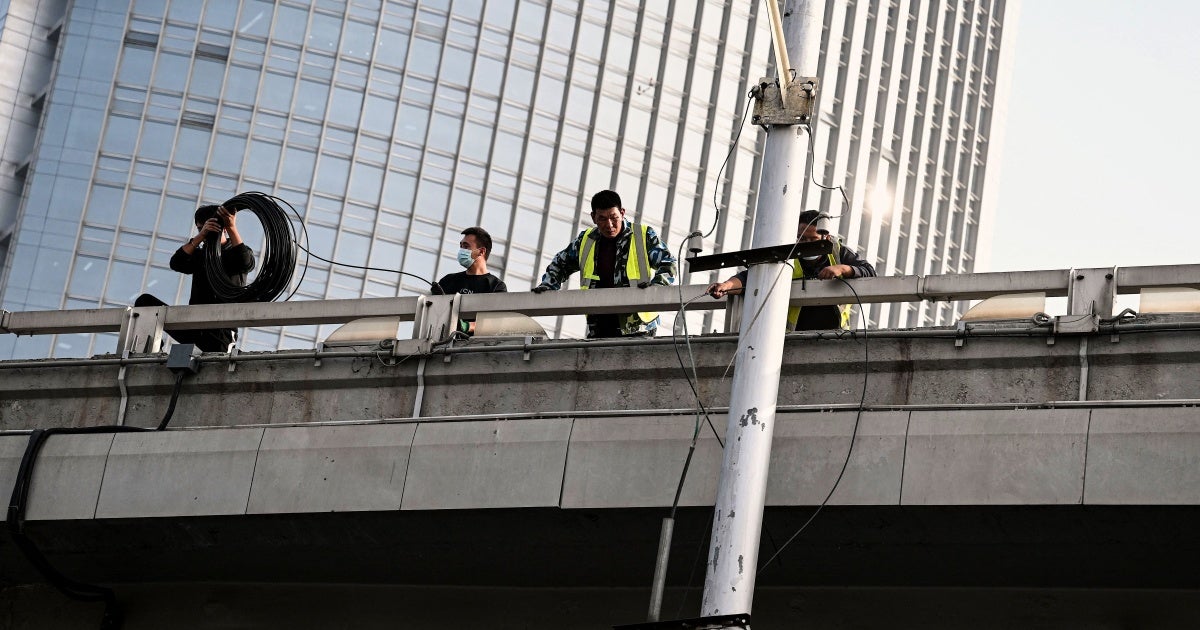 www.hrw.org
www.hrw.org
"The Chinese government may have taken away the ‘Bridge Man,’ but his arrest ignited widespread support for a free and democratic China,” said Maya Wang, associate China director at Human Rights Watch. “Two years since Peng Lifa was taken into police custody and forcibly disappeared, his message continues to resonate.” On October 13, 2022, a man in a construction outfit unfurled two banners on Sitong Bridge in Haidian district in Beijing. One read: “**We want food not Covid testing; we want freedom not lockdowns; we want dignity not lies. We want reform not the Cultural Revolution; we want to vote not a leader; we are citizens not slaves**.” And another read: “Go on strike, depose the traitorous dictator Xi Jinping.” The police immediately took him away and he has not been seen since. [...] Peng’s protest was rare in a country where police closely monitor all public spaces and dissidents. Control was especially tight in the capital ahead of the Chinese Communist Party’s 20th National Congress at the time of the protest. While authorities quickly censored all news about it, Peng’s messages nonetheless spread. [...] On July 30, 2024, a 22-year-old activist who participated in the White Paper movement, Fang Yirong (方艺融), put a Peng-inspired banner on a bridge in Loudi City, Hunan province, and posted a video online saying that he “hope[s] that the Chinese will get rid of autocracy and live a better life as soon as possible.” Police arrested Fang in early August and his current condition is also unknown. [Edit typo.]
 www.bbc.com
www.bbc.com
Chinese police have detained four workers of the Taiwanese iPhone maker, Foxconn, in circumstances Taipei has described as "strange". The employees were arrested in Zhengzhou in Henan province on "breach of trust" charges, Taiwan's Mainland Affairs Council said in a statement. [...] Taiwanese authorities suggested the detentions may be a case of "abuse of power" by Chinese police officers. And said the case undermines the confidence of businesses operating in China. In October last year, China's tax and land authorities launched an investigation into the company. At that time, Foxconn's founder Terry Gou was running as an independent candidate in Taiwan's presidential election. Taiwan has urged its citizens to "avoid non-essential travel" to the mainland as well as Hong Kong and Macau after China unveiled guidelines in June detailing criminal punishments for what Beijing described as diehard "Taiwan independence" separatists. [...]
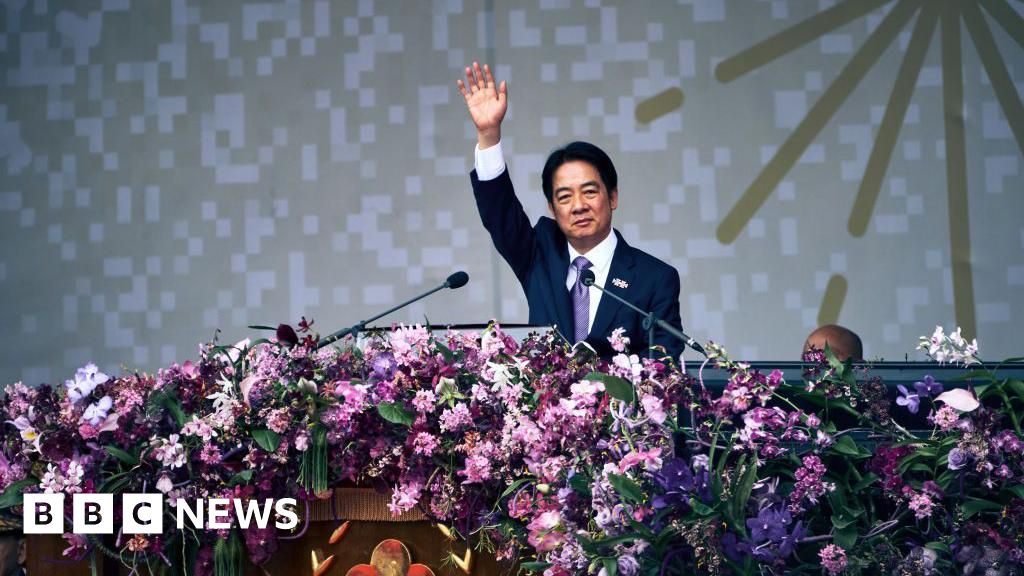 www.bbc.com
www.bbc.com
cross-posted from: https://feddit.org/post/3643028 > President William Lai has pledged to uphold Taiwan's self-governing status in his most high-profile public address since taking office earlier this year. > > In a thinly-veiled reference to China's claim over the island, Lai said he would "uphold the commitment to resist annexation or encroachment upon our sovereignty." > > At the same time, Lai promised to maintain "the status quo of peace and stability across the Taiwan Strait" and pledged to cooperate with Beijing on issues such as climate change, combating infectious diseases and maintaining regional security. > > Responding to Lai's speech, a spokeswoman for China's Ministry of Foreign Affairs said it "exposed his intransigent position" on Taiwan independence. > > Lai was speaking to a crowd in Taipei to commemorate Taiwan's National Day, only nine days after Communist China celebrated its 75th anniversary. > > "The Republic of China and the People's Republic of China are not subordinates to each other," he said, in a reference to the governments of Taipei and Beijing respectively. > > "On this land, democracy and freedom are thriving. The People's Republic of China has no right to represent Taiwan," he added. > > [...]
 www.bbc.com
www.bbc.com
In September, China announced that it was putting a stop to international adoptions, including cases where families were already matched with adoptee children. The painful wait will particularly determine the fates of China’s most vulnerable children - those with special needs. Up-to-date statistics are not readily available, but Beijing’s civil affairs ministry said that 95% of international adoptions between 2014 and 2018 involved children with disabilities. These children “will have no future” without international adoption as they are unlikely to be adopted domestically, says Huang Yanzhong, a senior fellow at the US-based Council on Foreign Relations. Beijing has not commented since the September announcement. It said the ban was in line with international agreements and showed China’s “overall development and progress”.
[Archived link](https://web.archive.org/web/20240917164236/https://capx.co/xi-jinpings-coercion-is-destroying-his-own-economy/) The [Chinese economic] model that has powered four decades of breakneck economic growth was reliant on cheap exports and wasteful state-led investment in property and infrastructure. It is no longer sustainable. It has led to soaring debt and diminishing returns, with China littered with ghost cities, containing 60 to 100 million empty or incomplete homes, while companies accounting for 40% of China’s home sales have defaulted. It is widely agreed that China needs to rebalance its economy, that consumers need to spend more, since private consumption accounts for just 39% of the economy – extremely low by world standards (the figure in the US is 68%). But there is no consumer confidence, with 80% of family wealth tied up in property and no meaningful social safety net. China's leader Xi Jinping hopes renewable energy tech can replace property as a new motor of growth, and mouth-watering subsidies have been thrown at industries ranging from solar panels to electric vehicles (EVs) and batteries, leading to massive over-capacity and vicious price wars. Yet the benign global environment that accompanied China’s earlier export splurges has gone; the world is much more wary, and both the US and EU have imposed hefty tariffs on Chinese EVs and solar panels they allege are being dumped at below cost. [,,,] China has never provided a level playing field for foreign business, but under Xi, the environment has become increasingly hostile. Last year, direct foreign investment into China fell to a 23-year-low. In Western boardrooms, once so bewitched with capturing a share of the mythical China market that they would put normally rational decision-making aside and suffer almost any indignity, ‘resilience’ has become the watchword. The Ukraine war has exposed the danger of over dependence on autocrats with hostile ambitions. [...]
 www.hrw.org
www.hrw.org
Chinese authorities are seeking to intimidate people from China living in Japan who take part in activities critical of the Chinese government, Human Rights Watch said today. The Chinese government’s harassment of people from China, including those from Xinjiang, Tibet, and Inner Mongolia, and their family members back home, appears aimed at deterring members of the diaspora from protesting against the government or engaging in events deemed politically sensitive. The Chinese authorities have also sought out diaspora members to provide information on others in Japan. “**Chinese authorities appear to have few scruples about silencing people from China living in Japan who criticize Beijing’s abuses**,” said Teppei Kasai, Asia program officer at Human Rights Watch. “The Japanese government should make clear to Beijing it won’t tolerate the long arm of China’s transnational repression in Japan.” [...] Most of those interviewed said that the Chinese police have contacted them or their relatives back home, pressuring them to end their activities in Japan. Several provided logs of messages from the Chinese social media platform WeChat, recordings of video calls, and CCTV footage that corroborated their accounts. **One person said they stopped participating in any politically sensitive in-person and online activities after receiving a call from Chinese authorities in 2024**. Another who initially agreed to be interviewed later decided not to participate out of fear that Chinese authorities would retaliate. [...] A brief exemplified summary: - Several ethnic Uyghurs from Xinjiang said that Chinese authorities contacted them through their relatives back home. - Several people from Inner Mongolia involved in promoting language rights and peaceful self-determination for Inner Mongolians, an ethnic minority, said that Chinese authorities had contacted them, often through their relatives back home. - A person from Tibet who promotes Tibetan culture in Japan said that when they went to the Chinese embassy in Tokyo to renew their passport, embassy officials told them they needed to return to Tibet to do so. -A person from Taiwan previously involved in Hong Kong’s pro-democracy activism in a third country said the Chinese embassy sent them multiple invitations to “retrieve important documents.” [...] A person from Taiwan previously involved in Hong Kong’s pro-democracy activism in a third country said the Chinese embassy sent them multiple invitations to “retrieve important documents.” [...] In recent years, the Japanese government has become increasingly vocal about the Chinese government’s human rights violations, including raising the issue with Chinese officials, and with resolutions in parliament to monitor the cases. [...] The Japanese government should recognize the threat posed by the Chinese government’s repression of Chinese nationals abroad, and help protect their basic rights by establishing a system for residents in Japan to report such incidents, Human Rights Watch said.
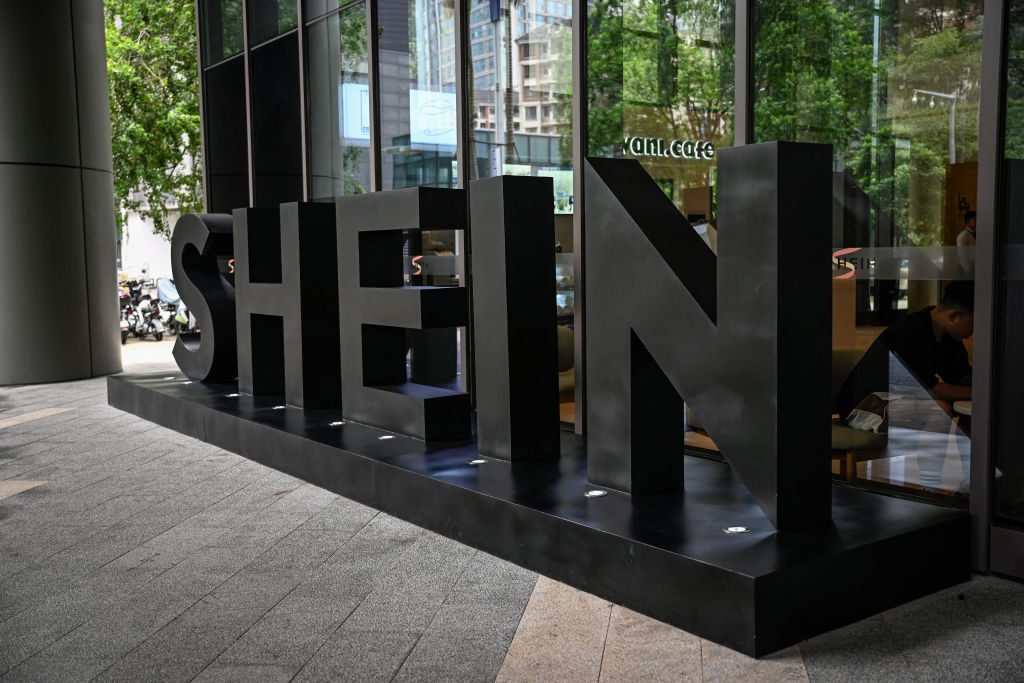 sourcingjournal.com
sourcingjournal.com
[Archived version](http://web.archive.org/web/20241008212700/https://sourcingjournal.com/topics/business-news/shein-scrutiny-london-imports-xinjiang-ipo-forced-labor-530182/) If Liam Byrne—a British Labour Party politician who leads parliament’s business and trade committee—gets his way, Shein might need to redirect its planned IPO float to Hong Kong or its home base in Singapore. He is calling for the U.K. government to ban imports made in the Xinjiang region in China, according to the Financial Times. That kind of legislative change will result in greater intensive scrutiny in the supply chain, and ultimately on producers such as Shein over alleged use of forced labor. Xinjiang is the Chinese region with links to the exploitation of Uyghurs and other Muslim ethnic groups via forced labor. The evidence of crimes against humanity are widely documented. [...] Even those connected to the fast-fashion firm end up getting pulled into Shein controversies. Last month, Italy launched a greenwashing probe into Shein. The Italian antitrust watchdog is probing Infinite Styles Services Co., a Dublin-based operation that manages Shein’s online presence. The probe’s focus is over the possibility of misleading sustainability claims connected with Shein’s clothing. Last month, Italy launched a greenwashing probe into Shein. The Italian antitrust watchdog is probing Infinite Styles Services Co., a Dublin-based operation that manages Shein’s online presence. The probe’s focus is over the possibility of misleading sustainability claims connected with Shein’s clothing. And in August, David Schwimmer, the leader of the London Stock Exchange Group, found himself pushing back on allegations that the Exchange had lowered its standards to court Shein so it could switch course from the U.S. to the U.K. for its flotation. [...] Shein initially planned to file its IPO in the U.S., but drew scrutiny from Washington lawmakers, who urged the Securities and Exchange Commission to block the firm due to concerns over ties to the Chinese government and alleged use of forced labor in its supply chain. [...] [Given the scrutiny in the UK], the most likely scenario could be a listing on the Hong Kong Stock Exchange. [...] But how a Hong Kong listing would fare also remains a big question mark. Hong Kong isn’t exactly the go-to choice for companies aiming to go public. Exchanges elsewhere, such as the U.S. or London, are seen as more active, and therefore get to attract more investors.
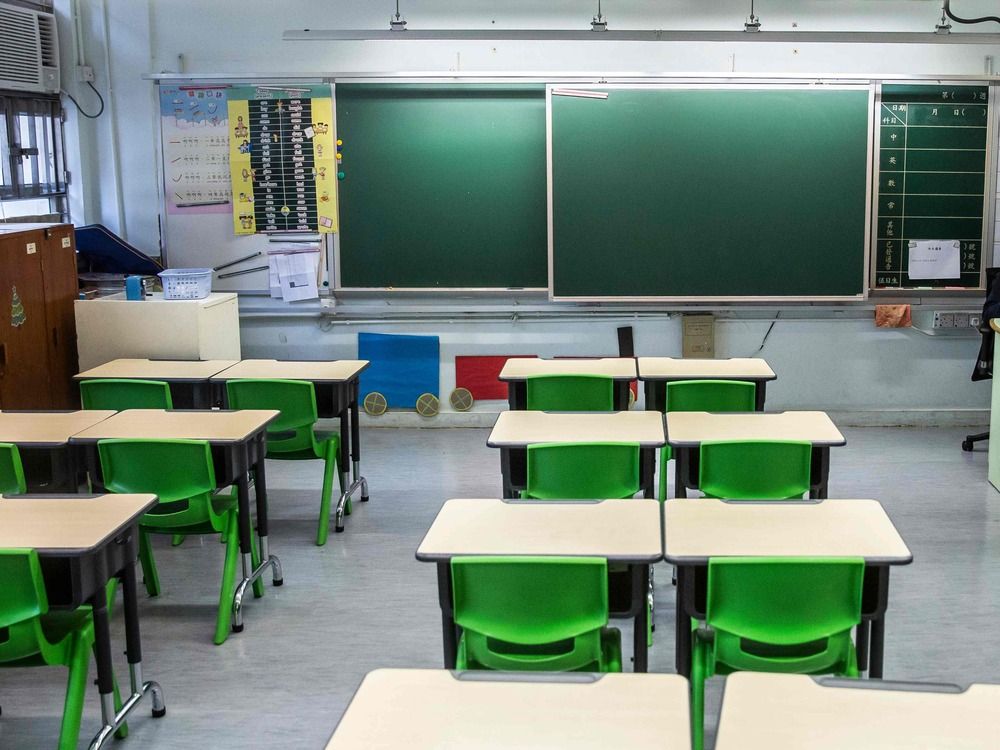 financialpost.com
financialpost.com
[Archived version](https://web.archive.org/web/20241008061644/https://financialpost.com/financial-times/china-demands-schoolteachers-passports) [Original version (paywalled)](https://www.ft.com/content/2aa2170d-2e31-4066-9813-d1b760db3402) **The passport collection drive, carried out under what is known as “personal travel abroad management,” allows local government officials to control and monitor who can travel abroad, how often and to where.** It comes as Xi steps up state involvement in everyday life and clamps down on official corruption. China’s powerful state security apparatus has also intensified its campaign against foreign espionage. Interviews with more than a dozen Chinese public sector workers and notices from education bureaus in half a dozen cities show restrictions on international travel have been greatly expanded from last year to include rank-and-file employees of schools, universities, local governments and state-owned groups. [...] “If we want to travel abroad, we have to apply to the city education bureau and I don’t think it will be approved,” said the teacher, asking that they and their city not be named. [...] Residents of restive regions such as Tibet lost their freedom to travel more than a decade ago. Starting in the mid-2010s, some areas applied “personal travel abroad management” rules to local teachers. Last year, after pandemic-era travel restrictions were lifted, more education bureaus began to introduce teacher travel restrictions and stepped them up this summer. [...] An entry-level salesperson at a bank in Nanjing said she was told to hand in her passport when she joined the state-owned group last year. After quitting in March, she had to wait six months for a “de-secrecy process” before she was able to retrieve it. In central Hunan province, a mid-level official at a local government investment fund said he gained approval from nine different departments for a holiday abroad but still could not retrieve his passport. [...] The restrictions are hitting retirees as well. A 76-year-old who retired from a state-owned aircraft maker more than 10 years ago said his former employer took his passport back this year for “security reasons” and barred him from visiting family abroad. [...] China’s foreign ministry said it was not aware of the situation and referred questions to the relevant authorities.
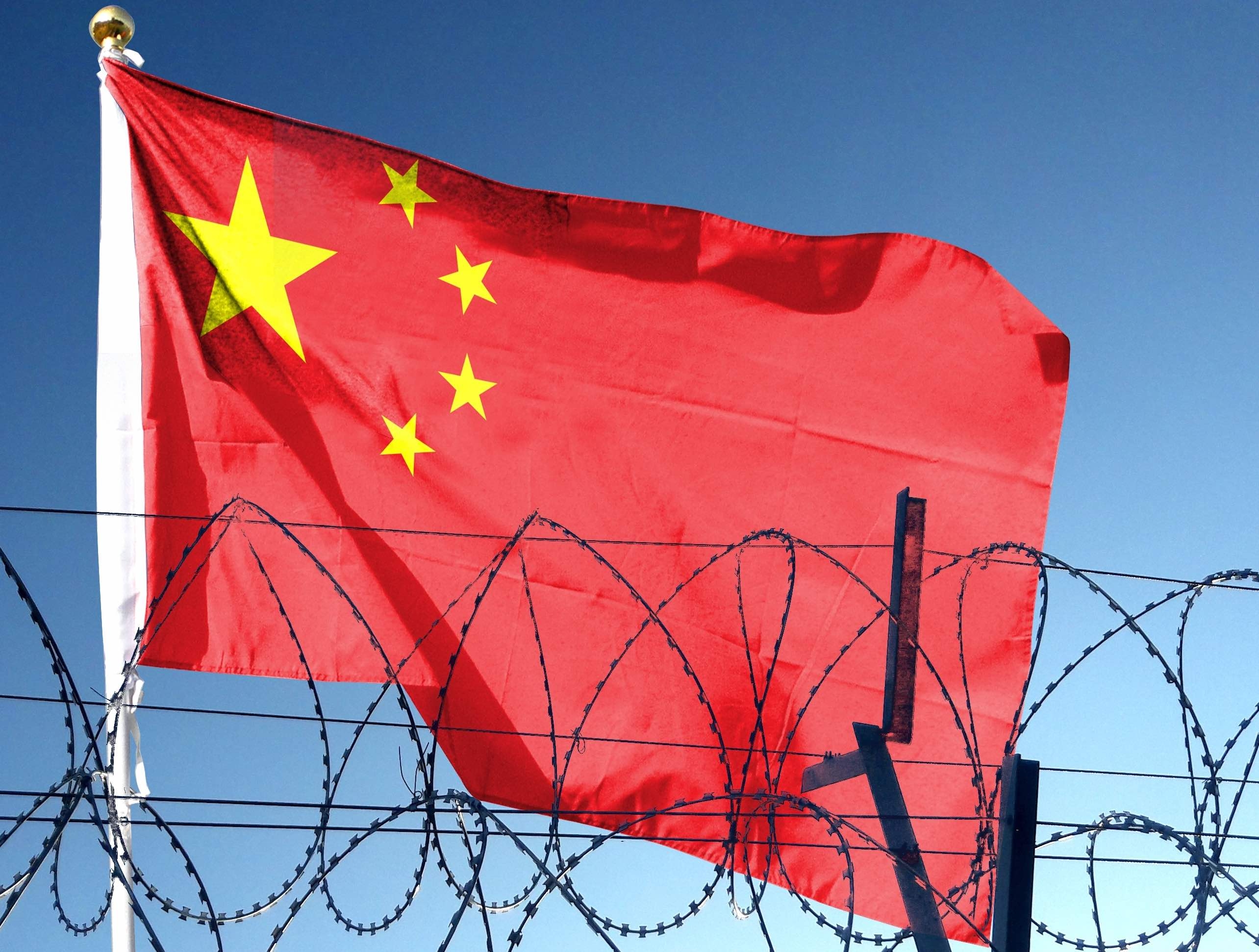 safeguarddefenders.com
safeguarddefenders.com
China criminalizes human rights defenders with laws on Disturbing Social Order, while the top crime category across whole population is Endangering Public Security, an analysis by the Safeguard Defenders has found. Safeguard Defenders analysed around 1,400 human rights-related court cases in China over the past 15 years. We used it show that the Chinese Communist Party continues to arrest and impose lengthy sentences on religious groups. Decided criminal cases in courts of first instance as recorded on the Chinese Supreme Court’s National Court Judicial Statistics Bulletin (Gongbao) have grown from 766,746 in 2009 to 1,038,523 in 2022. That’s an increase of more than one third over 13 years. Total decided cases reached a peak in 2019 at almost 1.3 million, according to Safeguard Defenders. Many of China’s laws are left intentionally vague, allowing the justice system great freedom to define its limits at will, the NGO adds. Decided cases in courts of first instance in the category Endangering Public Security have risen four-fold from 86,814 in 2009 to 350,290 in 2022. Obstructing the Administration of Social Order has also more than doubled from 133,639 to 298,803 over the same period. [Decided cases are close to, but not exactly the same as, convictions. Decided cases are those that have gone to trial and reached a verdict (both guilty and non-guilty) in a court of first instance (that means it does not include appeals). Since convictions in China are near 100%, we can assume that this number is almost the same as first-instance convictions, Safeguard Defenders says.] [Edit typo.]
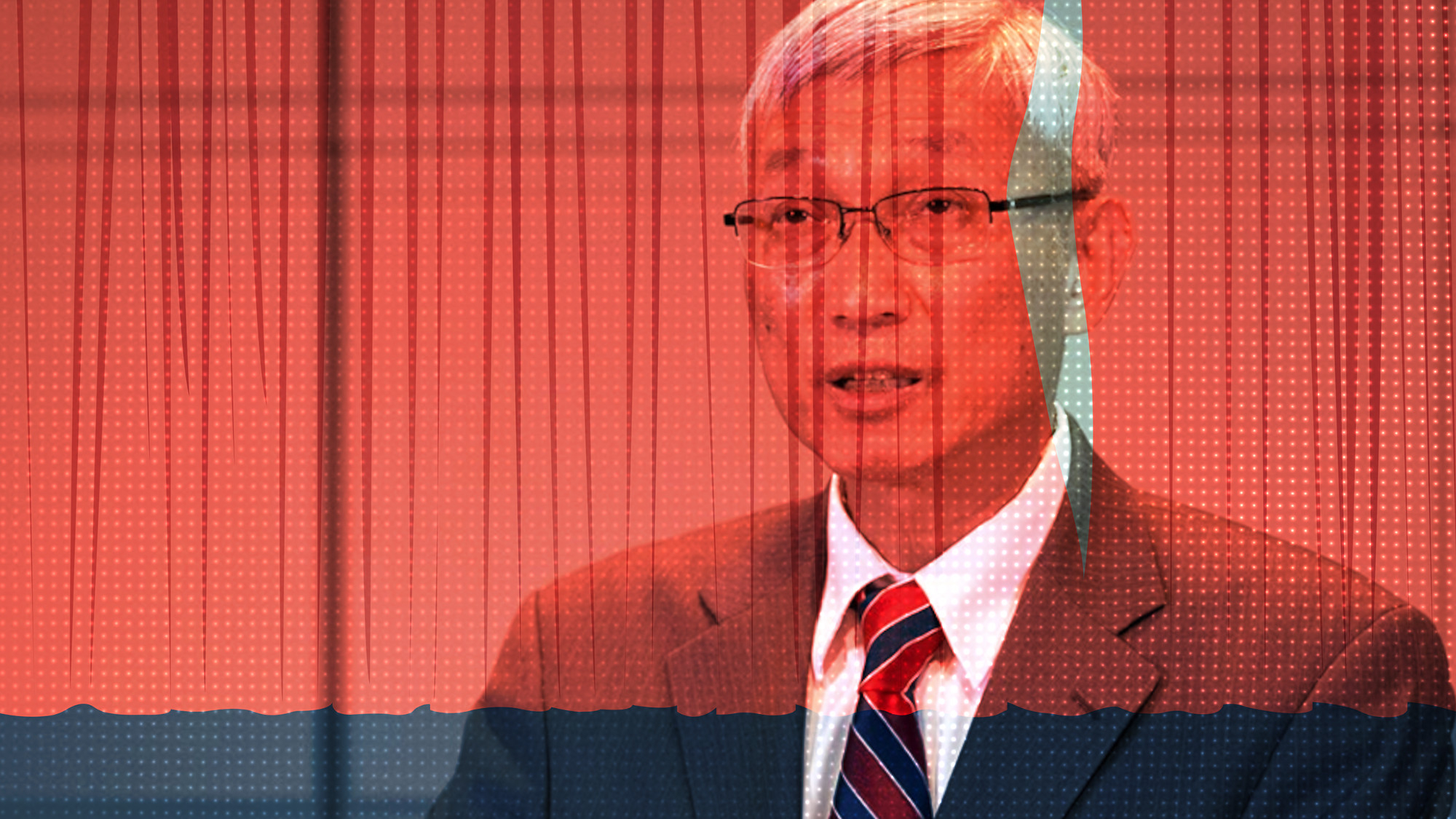 chinamediaproject.org
chinamediaproject.org
[Archived link](https://web.archive.org/web/20241008070903/https://chinamediaproject.org/2024/10/07/chinas-sentinel-state/) "China’s strategy involves decentralizing tasks horizontally across various security agencies, and vertically by incorporating civilian involvement," says Minxin Pei, a Chinese-American political scientist and author, currently serving as a professor of government at Claremont McKenna College, and an expert on Chinese governance, US-East Asia relations, mass surveillance in China, and the democratization of developing nations. "These civilians, while formally part of the security apparatus, take on key surveillance functions. This creates a unique system where surveillance is distributed and multifaceted, allowing the government to maintain control without the vulnerabilities that come with a single, centralized authority." [...] "Official Chinese media don’t play a significant role. Their primary function is to disseminate government-sanctioned messaging. I think that social media is the main target for surveillance because the government has a very sophisticated and effective way of monitoring what’s happening on social media. If a particular topic starts trending, they swiftly intervene to suppress it." [...] "This system [of China's control of people] was developed in the aftermath of Tiananmen Square. This taught the Chinese Communist Party a very important lesson: they needed to be aware of what was happening in society. Like other dictatorships, the Chinese Communist Party is very fearful of dissenting voices, especially activists, because they need to deter the population from engaging in protests, in anti-regime activities. Most of the time, these activities can be led by a small number of activists. Because they set an example, they show the rest of the population that they are not afraid. To make sure this does not happen, the government relies heavily on surveillance. If somebody dares to challenge the Party’s authority openly, that person will be discovered and punished. [...] "By introducing something like a cyber ID, **the Party hopes to enhance self-censorship, as people will be afraid to express their dissatisfaction online**. However, this approach might backfire. If individuals feel they can’t voice their frustrations online without repercussions, they may resort to more destructive means of expression. That’s why I believe this strategy may not be beneficial. Over time, this will also depend largely on the economy, as the Chinese security apparatus is primarily funded by local governments." [...] **"If the economy breaks down, it will be the first sign of trouble**. You’ll likely see a degradation of the security system and a rise in public discontent. Another concern is the potential for corruption within the system itself. Those in charge of security wield significant power and have access to resources. Instead of using funds for informants or upgrading the system, they might enrich themselves." [...]
 www.dagens.com
www.dagens.com
cross-posted from: https://feddit.org/post/3567672 > [Archive link](https://web.archive.org/web/20241003120019/https://www.dagens.com/world/espionage-in-swedish-nuclear-power-scientist-linked-to-chinas-dictatorship) > > A technical expert from Studsvik, a Swedish nuclear technology company, has been exposed for having links to the Chinese Communist Party. > > **The researcher, who held a critical security position within the company, was also a member of the United Front Expert Committee, part of the Chinese regime’s network aimed at expanding its global influence.** > > Despite his work in nuclear research in Sweden, the researcher participated in several inspection trips with high-ranking officials from the United Front. > > **It appears he was also recruited into China’s Thousand Talents Program, which aims to bolster China’s military and industrial strength.** According to the FBI, this program, controlled by the Chinese Communist Party, encourages members to steal foreign technology for China’s benefit. > > This was reported by TV4 Nyheterna. > > “The recruits in the Thousand Talents Program are expected to support the transfer of knowledge, particularly in cutting-edge technology,” explains William Hannas, former CIA director and now chief analyst at Georgetown University. “This poses a serious threat to countries targeted by these activities.” > > China’s United Front, a tool used to strengthen the Communist Party’s global power, has long worked to influence and recruit overseas Chinese to serve the Party’s interests. > > “The goal is to consolidate the Party’s power, eliminate threats, and increase the Communist Party’s influence worldwide,” said Alexis von Sydow, an analyst at the National China Knowledge Center.
 www.taipeitimes.com
www.taipeitimes.com
cross-posted from: https://feddit.org/post/3544675 > **China is trying to capitalize on the trend of young people dreaming of becoming influencers and training them to be pro-China.** > > The Chinese Communist Party (CCP) has started offering free influencer training classes in Fujian Province’s Pingtan, which would teach young Taiwanese how to livestream on video platforms such as Douyin (抖音) — turning them into “seeds” for “united front” campaigns, a Taiwanese government official said, who declined to be named. > > This is on top of trying to entice Taiwanese to participate in “united front” operations through half-priced cross-strait tour groups, the official said. > > The CCP is increasingly focusing its efforts on younger Taiwanese, especially Internet celebrities, they said, citing China’s inviting of several Taiwanese influencers to produce content in Xinjiang and the promotion of youth exchanges in China’s Zhejiang Province as examples.
 www.bssnews.net
www.bssnews.net
[Archived link](https://web.archive.org/web/20241003060704/https://www.bssnews.net/news/213747) China should set a "strong but achievable" target of slashing emissions at least 30 percent by 2035 when it submits updated climate commitments in coming months, a report urged Thursday. Signatories to the 2015 Paris climate accord must announce by next February their updated roadmaps to achieve the treaty's goal of limiting global temperature rises. China currently aims to peak carbon dioxide emissions before 2030 and reach carbon neutrality by 2060. But its policies and targets are rated "highly insufficient" to limit global warming to 1.5 Celcius above pre-industrial levels, according to the Climate Action Tracker project. The Centre for Research on Energy and Clean Air (CREA), a think tank that tracks climate progress, said Beijing should aim for an absolute emissions reduction target of 30 percent. As the world's largest emitter, China's "ambition in its climate agenda is decisive for keeping the international community on track," CREA said in a report. To meet that target, Beijing would need to slash electricity sector emissions by 30 percent and emissions from industry by a quarter. It should also set a target of reducing non-CO2 emissions by more than 35 percent, the group said. [...] But Teng Fei, deputy director of Tsinghua University's Institute of Energy, Environment and Economy, called the "extreme" goal of a 30 percent emissions cut "too ambitious to be achievable". "I think China is in the process of stabilising its emissions, so it's quite uncertain, for this period, to what extent China can reduce its overall emissions," he said. China is currently moving to bolster its flagging housing market, which could trigger higher demand in industry, and increase emissions. [...] Coal installation is continuing [in China] in a bid to secure baseload supply, and methane emissions are also rising. [...]
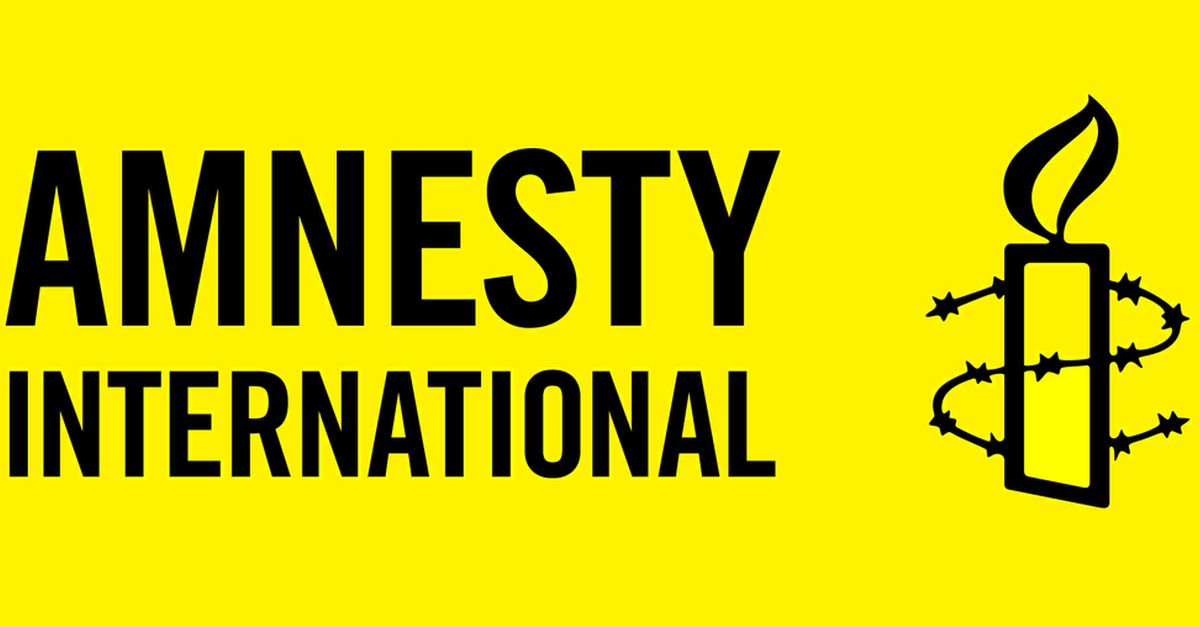 www.amnesty.org.uk
www.amnesty.org.uk
Amnesty International has designated three prominent human rights defenders from Hong Kong and mainland China prisoners of conscience today as the organisation called for their immediate and unconditional release. Human rights lawyers Chow Hang-tung and Ding Jiaxi, along with the free media advocate Jimmy Lai, are all currently imprisoned solely because of their peaceful human rights activism.
cross-posted from: https://feddit.org/post/3477581 > [Archived link](https://web.archive.org/web/20241004154827/https://www.bestit.wang/2024/09/27/10000-foreigners-detained-across-ccp-prison-network-journalist/) **Addition**: This is a [Witness Statement to the U.S. Congressional Executive Commission on China (pdf)](https://www.cecc.gov/sites/evo-subsites/www.cecc.gov/files/evo-media-document/Cedric%20Witek%20-%20Statement%20to%20the%20US%20Congressional%20Executive%20Commission%20on%20David%20McMahon%20Case_0.pdf) by Cedric Witek, a French national and corporate-crime investigator who has helped foreign nationals imprisoned in China. > > An Australian Senate Committee has been told that around 10,000 foreigners, including Australians, are currently held in the Chinese Communist Party’s (CCP) prison system. > > At an inquiry hearing on Sept. 26, Peter Humphrey, a former British journalist and businessman involved with China for 50 years, shared his experience of being wrongfully detained by the communist regime. > Humphrey and his Chinese American wife were arrested in 2013 on false charges of illegal “information gathering.” > > [...] > > Humphrey also said the CCP did not provide Australians or foreigners with proper legal proceedings. > “Not a single Australian prisoner has had a fair and transparent trial. Some are in dire health. Some are over 50, aging rapidly,” he told the Senate Committee. > > [...] > > The former businessman explained that all organs of the judicial system–the police, the prosecution, the judiciary, the prisons, and Chinese lawyers–formed an organic whole under the regime’s complete control. > > “No judge is independent or impartial. He is just a messenger of the party,” he said. > > **“The system is exploited by connected individuals to harm people they have a grudge against."** > > “Cases are built upon forced confessions, often televised and upon forced witness statements.” > > At the same time, Humphrey shared about the harsh living conditions of prisioners [...] in CCP’s prisons, where they had to sleep on the floor in a small cell full of people and eat filthy, appalling food. > > [...] > > There was also the withholding of proper medical treatment [from prisoners], even for cancer, Humphrey added. > > [...] > > Furthermore, Humphrey said Australia and other countries had a mindset of putting commercial relations above the interests of individual citizens who had been wrongfully detained. > > [...] > > Specifically, Humphrey said there needed to be legislation that would put a greater onus on the Australian government to act, and legislation that would punish China for its acts of arbitrarily and unjustly detaining Australian citizens. > > “You need to send out the message that if you touch an Australian, we’re going to make you and your friends’ life hell,” he said. > “Western democracies should link hands in this approach and put on a united front. > > [...]
 www.euronews.com
www.euronews.com
cross-posted from: https://feddit.org/post/3451147 > [Archived link](http://web.archive.org/web/20241004114341/https://www.euronews.com/my-europe/2024/10/04/brussels-breaks-impasse-after-eu-countries-fail-to-agree-on-chinese-ev-tariffs) > > European Union countries failed to agree on whether to slap China-made electric vehicles (EVs) with steeper tariffs during a closely watched vote that ended with too many abstentions, forcing the European Commission to overcome the political impasse and push its proposal over the finish line. > > The outcome of Friday's vote was not publicly available, although several diplomats told Euronews how each member state positioned itself: > > - 10 were in favour: Bulgaria, Denmark, Estonia, France, Ireland, Italy, Lithuania, Latvia, the Netherlands and Poland. (45.99% of the EU population) > - 12 abstained: Belgium, the Czech Republic, Greece, Spain, Croatia, Cyprus, Luxembourg, Austria, Portugal, Romania, Sweden and Finland. (31.36%) > - Five were against: Germany, Hungary, Malta, Slovenia and Slovakia. (22.65%) > > The high number of abstentions reflects long-standing qualms about how Europe should stand up to China. Although the political consensus says that Beijing's unfair trade practices merit a forceful, united response, threats of commercial retaliation appear to have dampened the resolve of many capitals as the make-or-break date neared closer. > > It was up to the Commission, which has exclusive powers to set the bloc's commercial policy, to break the gridlock and ensure the duties go through.
 www.telegraph.co.uk
www.telegraph.co.uk
cross-posted from: https://feddit.org/post/3446104 > [Archived link](https://web.archive.org/web/20241003064010/https://www.telegraph.co.uk/world-news/2024/09/21/british-travel-bloggers-sugarcoating-china-uyghur-problem/) > > In the heart of Xinjiang, the Chinese region where more than one million Uyghurs are believed to be detained in re-education camps, two carefree British travel vloggers cheerfully introduce their viewers to “one of the most controversial areas” of the country. > > Journalists are harassed and heavily monitored in the rugged western province, where Western governments and rights groups have accused the authorities of suppressing Muslim minorities through mass surveillance, abuse and political indoctrination. > > But foreign YouTube influencers are warmly welcomed by the normally censor-happy Chinese government, which seizes on their happy-go-lucky content to legitimise its own narrative that no human rights abuses are taking place. > > [...] > > As the country reopens for travel after years of pandemic isolation, foreign influencers, including many Brits, are heading East armed with cameras and tripods, eyeing an increasingly lucrative YouTube market with an eager audience ready to increase their ratings. > > The Chinese government has given them a helping hand with a raft of new visa-free policies, and the country received over 17 million foreign travellers in the first seven months of this year, up by almost 130% year-on-year, according to foreign ministry figures. > > [...] > > But a growing number are entering lesser-known regions including Xinjiang, which for years has been beset by allegations of severe human rights abuses and repression that Beijing justifies as necessary to fight terrorism. > > Some YouTubers setting foot in the rugged region attempt to draw viewers with sensational titles about exposing Western media “lies” about Xinjiang or by alluding to the risks of travelling there. > > [...] > > There is no suggestion any of the vloggers are acting at the behest of the Chinese government or receiving its money, but titles about media deception echo official state messaging about the West’s perceived anti-China narrative, particularly on fundamental rights. > > For China, the influx of influencers offers the opportunity to rebut overseas criticisms and reinforce its stance through highlighting the unimpeded visits of awestruck foreigners. > > The footage, amplified by Chinese social media platforms and state-run outlets, receive hundreds of thousands of views and screeds of favourable comments. > > An increasing number of international vloggers were visiting Xinjiang “with great curiosity,” noted a recent article in the [state-controlled] Global Times. > > [...] > > Daria Impiombato, a cyber analyst at the Australian Strategic Policy Institute, has co-written several reports on China’s multilayered ways of folding local and foreign influencers into its propaganda strategy. > > She said vloggers with large platforms had a responsibility to inform themselves and to be sceptical. > > “There needs to be a reckoning with that type of platform,” she said. **“It’s like influencers who are going to Syria, just doing travel vlogs from Syria without talking about years and years of war and devastation. You can’t do that, and you can’t do that in Xinjiang either.”** > > [...] > > Maya Wang, the associate China director at Human Rights Watch, urged travellers to be more aware in societies suffering human right abuses and “not be complicit in the censorship and disinformation that the Chinese government hopes to achieve.” >
 www.taipeitimes.com
www.taipeitimes.com
cross-posted from: https://feddit.org/post/3444980 > [Archived link](https://web.archive.org/web/20241004051018/https://www.taipeitimes.com/News/front/archives/2024/10/04/2003824760) > > **The Taiwanese government warned Chinese not to say anything that would be harmful to the autonomous status of Taiwan or undermine its sovereignty.** > > A Chinese couple accused of disrupting a pro-democracy event in Taipei organized by Hong Kong residents has been deported, the National Immigration Agency said in a statement yesterday afternoon. > > A Chinese man, surnamed Yao (姚), and his wife were escorted by immigration officials to Taiwan Taoyuan International Airport, where they boarded a flight to China before noon yesterday, the agency said. > > The agency said that it had annulled the couple’s entry permits, citing alleged contraventions of the Regulations Governing the Approval of Entry of People of the Mainland Area into the Taiwan Area. > > [...] > > The Chinese nationals were aware they were contravening the rules when they applied for temporary entry permits based on visiting family members living in Taiwan, it said. > > In a separate statement issued yesterday, the Taiwan's Mainland Affairs Council (MAC) denounced the couple, accusing them of “abusing” the immigration system. > > [...]
[Archived link](https://web.archive.org/web/20241001070006/https://apnews.com/article/china-disinformation-fake-news-russia-3085f10d6edca36f6415d6410e5ef874) Shannon Van Sant, an adviser to the Committee for Freedom in Hong Kong Foundation, tracked a network of dozens of sites that posed as news organizations. One site mimicked The New York Times, using a similar font and design in what she called an attempt at legitimacy. The site carried strongly pro-Chinese messages. When Van Sant researched the site’s reporters she found no information. Their names didn’t belong to any known journalists working in China, and their photos bore telltale signs of being created with AI. “**Manipulation of the media is ultimately a manipulation of readers and the audience, and this is damaging to democracy and society**,” Van Sant said. [...] In addition to its state media, Beijing has turned to foreign players — real or not — to relay messages and lend credibility to narratives favoring the Communist Party, said Xiao Qiang, a research scientist at the School of Information at the University of California, Berkeley. Xiao also is editor-in-chief of China Digital Times, a bilingual news website that aggregates information from and about China. [...] Beijing’s methods are wide-ranging and links to the government are often difficult to prove, Xiao said. But whether it’s journalists with American-sounding names or an Indian influencer, the consistently pro-Beijing messages give them away. “The implicit message is the same — that the Chinese Communist Party works for its people,” Xiao said. Analysts at the cybersecurity firm Logically identified 1,200 websites that had carried Russian or Chinese state media stories. The sites often target specific audiences and have names that sound like traditional news organizations or defunct newspapers. Unlike Russia or Iran, which have displayed clear preferences in the U.S. presidential campaign, Beijing is more cautious and focused on spreading positive content about China. [...] Beijing has invested in state media such as the Xinhua news agency and China Central Television to convey its messages to global audiences in various languages and platforms. Media groups at the local level are creating “international communication centers” to build an overseas presence with websites, news channels and social media accounts. Beijing also has struck media partnerships worldwide. [...] **To tell its story, Beijing has not shied away from using fake personas**. A 2023 State Department report detailed the case of a published writer named Yi Fan, originally described as a Chinese foreign ministry analyst. Yi morphed into a journalist, then became an independent analyst. Yi’s details changed, but the message did not. Through published commentaries and writings, Yi trumpeted close ties between China and Africa, praised Beijing’s approach to environmental sustainability and argued that China must counter distorted Western narratives. Then there was Wilson Edwards, a supposed Swiss virologist quoted in Chinese media as a COVID-19 expert who criticized the U.S. response. But Swiss officials found no evidence he existed. “If you exist, we would like to meet you!” the Swiss Embassy in Beijing wrote on social media.
[Archived link](https://web.archive.org/web/20241002094937/https://muse.jhu.edu/article/937730) ***Essay by Carl Minzner, Professor at Fordham Law School and a senior fellow for China Studies at the Council on Foreign Relations.*** **China is steadily sliding deeper into the counterreform era. Economically, it is slowing down. Ideologically, it is closing up. Politically, it is steadily pivoting back toward personalistic one-man rule. As these trends deepen, Beijing’s leaders are erasing core elements of both the reform and revolutionary eras, reviving ruinous Maoist governance practices of the 1950s, and turning back to China’s imperial history in an effort to build a new ideological foundation for their authoritarian rule. Far from paving the way for China’s twenty-first-century rise, Beijing’s counterreforms are exacerbating its structural problems, weakening the nation and undermining its stability.** [...] This era—the time of Xi Jinping—is the age of counterreform. Beijing's prime goal is no longer revolutionary social change or even economic growth, but regime stability [...] As Beijing ... slides deeper into the morass of the counterreform era, the PRC [People's Republic of China] is in fact becoming far weaker and less stable. [...] The trend toward closure is spreading. Security officials regularly fan fears of foreign espionage, particularly around April 15, designated since 2016 as National Security Education Day. A 2023 anti-espionage crackdown on consulting firms shocked foreign corporations trying to conduct statistical research and due diligence. China's LGBTQ+ groups, meanwhile, are worried by fresh official messages that not only their organizational activities but their members' own sexual and gender identities themselves may be politically problematic. New laws criminalize defamation of regime-designated martyrs and heroes. [...] Economically, China continues to slow. Covid lockdowns, a rapidly aging population, and the implosion of a massive property bubble have taken a toll on the once buzzing economy. Annual growth, which registered 6.7 percent as recently as 2016, has steadily fallen. For 2024, the official rate is expected to come in at no higher than 5 percent (the IMF projection) and could be as low as 3 percent. [...] Slowing growth is causing real pain. In 2023, youth unemployment [End Page 7] surged to a record high, topping 21 percent. Local governments reliant on land sales to finance rising expenditures are finding themselves strapped for cash. With surging local-government debt has come unpaid wages and pensions and utility price hikes, which ranged from 10 to 50 percent this year in Shanghai and Guangzhou. China's economy continues to boast real strengths, of course. It leads the world in the manufacture of batteries, solar cells, and electric vehicles. **But with graying demographics, unfavorable geopolitical winds, and national leaders who resist a shift to a growth model focused on domestic consumption,** China faces a slower, more stagnant economic future. [...] The party-state's propaganda organs have been infusing portrayals of Xi with the strengthening aroma of a cult of personality. Official portraits of him grow ever larger while CCP [Chinese Communist Party] publications grow ever more replete with his quotations. And woe be to the careless cadre who misprints the supreme leader's name. When, in March 2023, a single sentence in the CCP-flagship People's Daily that was supposed to mention him nonetheless failed to do so, millions of copies were recalled. [...] The ruthless and comprehensive "rectification" of Hong Kong since 2019, however, has been the most spectacular example of Beijing's erosion of prior bureaucratic and technocratic norms. [...] Stronger controls over private life are returning as well. To ward off the specter of social unrest, Xi has been reviving Maoist models of neighborhood surveillance. Since 2017, moreover, **mass political detentions in the far northwestern region of Xinjiang have seen more than a million Uyghurs and other ethnic minorities sent to reeducation camps**. Well-off urban Chinese citizens initially brushed these off as anachronistic ideological throwbacks or necessary measures to tame ethnic trouble in remote borderlands. [...] What I see [...] is a China in decay. The country today resembles less a rapidly rising power such as the Soviet Union or Japan in the 1950s—full of vigor, on the cusp of a decades-long expansion—and more a mix of stagnant Brezhnevera USSR and 1990s Japan, after its economic bubble collapsed and it entered a long period of sluggish growth. Resting crazy-quilt style atop the whole thing is a patchwork of unresolved Maoist politics, latent reform-era social tensions (inequality is now as sharp as it is in the United States), and the approaching reality of China's becoming (by about 2050) the world's most aged society. [...] **As China heads deeper into the counterreform era, the country's worst enemies are neither the foreign threats that Beijing imagines around every corner nor the rising domestic tensions that the regime wants so desperately to suppress. Rather, they are China's own historical and institutional demons that the PRC's leaders are in the process of reviving.**
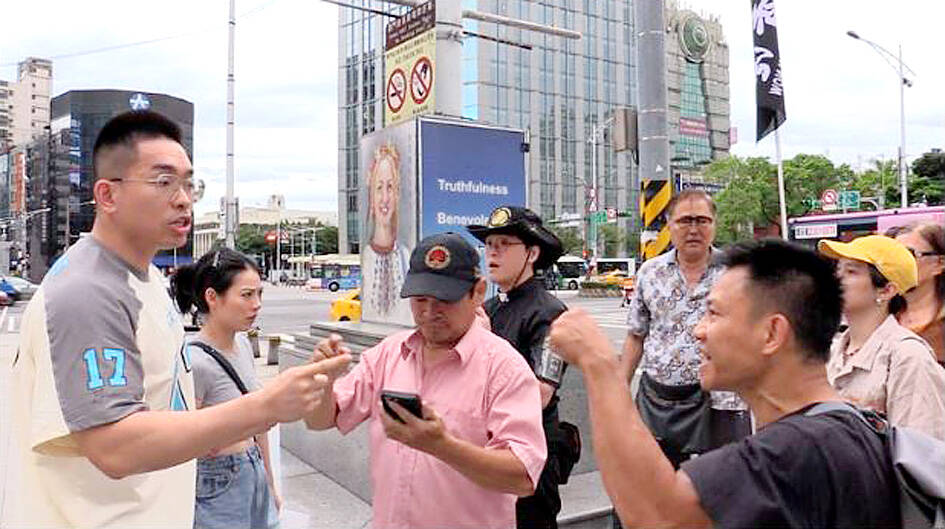 www.taipeitimes.com
www.taipeitimes.com
cross-posted from: https://feddit.org/post/3413944 > [Archived link](https://web.archive.org/web/20241003050147/https://www.taipeitimes.com/News/taiwan/archives/2024/10/03/2003824722) > > Chinese tourists allegedly interrupted a protest in Taiwan held by Hong Kongers, knocked down several flags and shouted: “Taiwan and Hong Kong belong to China" > > Hong Kong democracy activists were holding a demonstration as Tuesday was China’s National Day. > > A video posted online by civic group Hong Kong Outlanders shows a couple, who are allegedly Chinese, during the demonstration. > > “Today is China’s National Day, and I won’t allow the displaying of these flags,” the male yells in the video before pushing some demonstrators and knocking down a few flagpoles. > > [...] > > “Today is to commemorate Hong Kong’s martyrs. We do not celebrate China’s National Day,” it quoted a demonstrator as saying. “We are in Taiwan, and people are free to express their opinion.” > > Taiwanese independence advocate Lee Wen-pin (李文賓) and the man reportedly pushed and slapped each other. > > “You cannot touch other people’s belongings... We are asking you to leave now,” Lee said, before he called the police. > > The man refused to leave and kept saying that “China has sovereignty over Taiwan,” and that “Taiwan and Hong Kong belong to China.” > > “Taiwan belongs to Taiwanese, and Hong Kong belongs to Hong Kongers,” the demonstrators said in response. > > Later, police officers arrived at the scene and persuaded the couple to leave. > > [...]
[Archived version](https://web.archive.org/web/20240930221527/https://www.cbc.ca/news/politics/china-students-canada-intimidation-threats-1.7332268) [...] Ruohui Yang is one of those students. He said he came to Canada in 2015 when he was 15 years old because his parents wanted him to study abroad. In Canada, he said, he began learning things about his home country — such as details of the 1989 Tiananmen Square massacre — that challenged the Chinese government's version of events. [...] "I do already receive lots of threatening [messages], lots of swearing words, insults on my different social media accounts," he said. [...] In May, Amnesty International released a report on the experiences of Chinese dissidents abroad. The report said many Chinese international students attending foreign universities are living in a climate of fear. "They feel compelled to self-censor and curtail their social and academic activities and relationships or else risk repercussions from the Chinese state," the report says. [...] An organization called the Chinese Students and Scholars Association (CSSA) is active on university campuses across the country. A 2019 report by the National Security and Intelligence Committee of Parliamentarians (NSICOP) quotes the Canadian Security Intelligence Service (CSIS) describing the CSSA as "an important support mechanism for international students studying abroad [that provides] a social and professional network for students." But the NSICOP report also reported growing public alarm over the relationship between the CSSA and the Chinese government's embassies and consulates. [...]
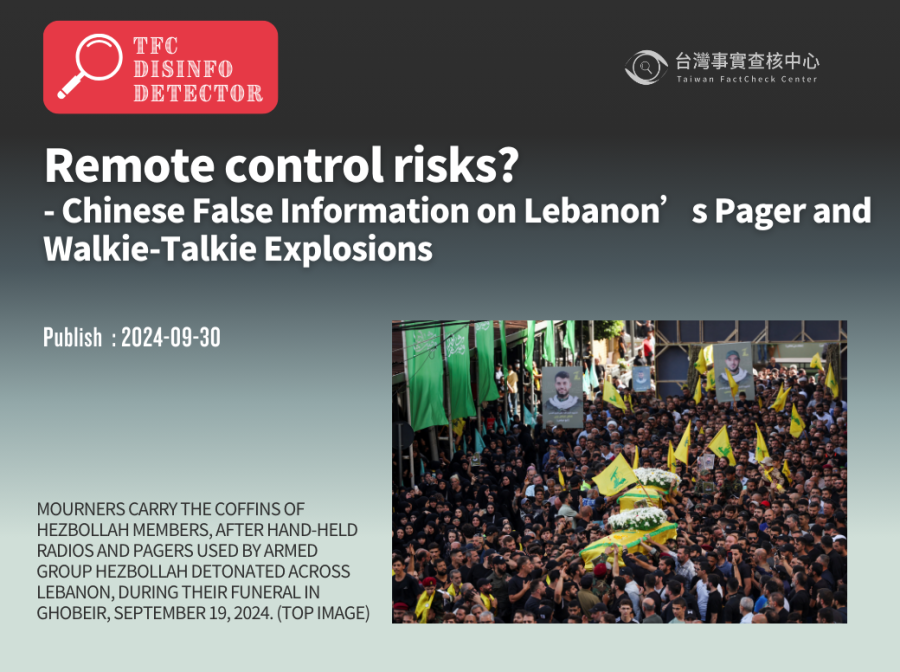 tfc-taiwan.org.tw
tfc-taiwan.org.tw
cross-posted from: https://feddit.org/post/3385576 > [Archived link](http://web.archive.org/web/20240930171544/https://tfc-taiwan.org.tw/articles/11065) > > The pager and walkie-talkie explosions that occurred in Lebanon on September 17 and 18 resulted in serious casualties and shocked the world. False information quickly circulated over social media among Chinese language users. [...] **For Chinese nationalists, the explosions provided an opportunity to justify the concerns about Western products and demonstrate that only Chinese-made electronic equipment can provide consumer safety.** > > Several themes emerged from the Chinese disinformation pieces: > > 1. The scenes that falsely depicted the explosions > > 2. The incorrect allegation that Taiwan, Israel, Japan, and the United States were part of a conspiracy network > > 3. Concerns that iPhones could also explode > > 4. The claim that wealthy Middle Eastern countries have quickly abandoned Western-made electronic devices in favor of Chinese products, particularly those made by Huawei
 www.bbc.com
www.bbc.com
China’s sputtering economy has its worried leaders pulling out all the stops. They have unveiled stimulus measures, offered rare cash handouts [highly unusual as the Chinese Communist Party rejects any kind of social welfare because -according to the party's narrative- it makes people lazy], held a surprise meeting to kickstart growth and tried to shake up an ailing property market with a raft of decisions - they did all of this in the last week. On Monday, Xi himself spoke of "potential dangers" and being "well-prepared" to overcome grave challenges, which many believe was a reference to the economy. [...] Beyond the crisis in real estate, steep public debt and rising unemployment have hit savings and spending. The world’s second-largest economy may miss its own growth target - 5% - this year. [...] [...] New pieces of research [...] found that Chinese people were growing pessimistic and disillusioned about their prospects. The second is a record of protests, both physical and online, that noted a rise in incidents driven by economic grievances. [...] Researchers conducted their surveys in 2004 and 2009, before Xi Jinping became China’s leader, and during his rule in 2014 and 2023. The sample sizes varied, ranging between 3,000 and 7,500. In 2004, nearly 60% of the respondents said their families’ economic situation had improved over the past five years - and just as many of them felt optimistic about the next five years. The figures jumped in 2009 and 2014 - with 72.4% and 76.5% respectively saying things had improved, while 68.8% and 73% were hopeful about the future. However in 2023, only 38.8% felt life had got better for their families. And less than half - about 47% - believed things would improve over the next five years. Meanwhile, the proportion of those who felt pessimistic about the future rose, from just 2.3% in 2004 to 16% in 2023. [...] Respondents were from 26 Chinese provinces and administrative regions. The 2023 surveys excluded Xinjiang and parts of Tibet. [...] Those who were not willing to speak their minds did not participate in the survey, the researchers said. Those who did shared their views when they were told it was for academic purposes, and would remain confidential. Their anxieties are reflected in the choices that are being made by many young Chinese people. With unemployment on the rise, millions of college graduates have been forced to accept low-wage jobs, while others have embraced a “lie flat” attitude, pushing back against relentless work. Still others have opted to be “full-time children”, returning home to their parents because they cannot find a job, or are burnt out. [...] Analysts believe China’s iron-fisted management of Covid-19 played a big role in undoing people’s optimism. “[It] was a turning point for many… It reminded everyone of how authoritarian the state was. People felt policed like never before,” said Alfred Wu, an associate professor at the Lee Kuan Yew School of Public Policy in Singapore. Many people were depressed and the subsequent pay cuts "reinforced the confidence crisis,” he added. [...] **Does hard work pay off? Chinese people now say ‘no’** In 2004, 2009 and 2014, more than six in 10 respondents agreed that "effort is always rewarded" in China. Those who disagreed hovered around 15%. Come 2023, the sentiment flipped. Only 28.3% believed that their hard work would pay off, while a third of them disagreed. The disagreement was strongest among lower-income families, who earned less than 50,000 yuan ($6,989; £5,442) a year. [...] In 2023, a majority of the respondents in the Whyte and Rozelle study believed people were rich because of the privilege afforded by their families and connections. A decade earlier, respondents had attributed wealth to ability, talent, a good education and hard work. **This is despite Xi’s signature “common prosperity” policy aimed at narrowing the wealth gap, although critics say it has only resulted in a crackdown on businesses.** [...] [Researchers also] saw a rise in protests led by rural residents and blue-collar workers over land grabs and low wages, but also noted middle-class citizens organising because of the real estate crisis. Protests by homeowners and construction workers made up 44% of the cases across more than 370 cities. [...] Chinese leaders are certainly concerned [...] **Censors have been cracking down on any source of financial frustration - vocal online posts are promptly scrubbed, while influencers have been blocked on social media for flaunting luxurious tastes**. State media has defended the bans as part of the effort to create a “civilised, healthy and harmonious” environment. More alarming perhaps are reports last week that a top economist, Zhu Hengpeng, has been detained for critcising Xi's handling of the economy. The Communist Party tries to control the narrative by “shaping what information people have access to, or what is perceived as negative”, Mr Slaten said.
 www.theguardian.com
www.theguardian.com
cross-posted from: https://feddit.org/post/3363029 > [Archived link](https://web.archive.org/web/20240924230734/https://www.theguardian.com/world/2024/sep/25/a-path-towards-freedom-the-new-route-to-europe-for-desperate-chinese-migrants) > > The fear of what the future held for Zhang (not his real name) and his children propelled the 39-year-old Chinese citizen from Shandong province on a journey so difficult and dangerous that many struggle to understand why someone from China would embark on it. Most of Zhang’s new neighbours in the European Balkans come from war-torn countries in the Middle East. Until recently, Zhang had a stable job working for a private company in the world’s second-biggest economy, earning an above average salary. But the political environment in China left him feeling that he had no choice other than to leave. > > Zhang is one of a small but growing number of Chinese people who are travelling to the Balkans with the hope of getting into the EU by whatever means necessary. > > [...] > > David Stroup, a lecturer of Chinese politics at the University of Manchester, says that the rapid expansion of China’s surveillance state during the pandemic combined with a gloomy economic outlook were some of the driving forces for this new wave of Chinese migrants. > > “The lockdowns created a sense that ordinary people who were just living their lives could somehow find themselves under heavy observation of the state or subjected to long arbitrary periods of lockdown and confinement,” Stroup said. > > [...] > > Part of the reason that Bosnia is an attractive staging post for Chinese migrants, is that like its neighbour Serbia, it offers visa-free travel. Aleksandra Kovačević, spokesperson for Bosnia’s Service for Foreigner’s Affairs, a government department, said that Chinese people were “gaining statistical significance as persons who increasingly violate migration regulations of Bosnia and Herzegovina”. She said that along with Turkish citizens, Chinese people were trying to use legal entry into Bosnia as a way to “illegally continue their journey to the countries of western Europe”. > > [...] > > Many ordinary Chinese occasionally feel the rough end of the government’s tight control over public speech. Most learn to keep their head down and, begrudgingly or not, quietly navigate the invisible red lines that dictate what can be freely talked about. But Zhang couldn’t bear it. > > [...] > > “China’s control over speech is getting tighter and tighter. They don’t allow people to talk about political parties, and no matter if the government is doing a good or bad job, they don’t allow people to talk about it. It is limiting people’s freedom of speech tremendously, and that’s the most important thing I can’t accept,” Zhang says. “The economy is secondary”. > > [...]
 www.theregister.com
www.theregister.com
[Archived link](https://web.archive.org/web/20240930120210/https://www.theregister.com/2024/09/30/china_satellite_censorship/) **Beijing has published its proposed regulations for satellite broadband, including a requirement that operators conduct censorship in real time.** **It has been suggested that the constellation system will help run and export the nation's content censorship system, known as the Great Firewall.** [...] In its latest draft rules, the Cyberspace Administration of China proposes any organization or individual using terminal equipment with direct connection to satellite services is not allowed to "produce, copy, publish, or disseminate content prohibited by laws and administrative regulations, such as content that incites subversion of state power, overthrows the socialist system, endangers national security and interests, damages the national image, incites secession of the country, undermines national unity and social stability, promotes terrorism, extremism, ethnic hatred, ethnic discrimination, violence, pornography, and false information." It clarifies that terminal equipment includes civilian handheld, portable, and fixed terminals, as well as terminals installed on aircraft, ships, and vehicles – essentially any device that enables users to access satellite communication systems for voice calls, text messaging, and data exchange. [...] The draft rules further include articles that would make tracking of providers and users easier. This includes requiring providers to: - Obtain licenses and approvals, whether telco, radio frequency related or otherwise; - Collect real identity information from those using its services, as China already requires of telcos; - Integrate monitoring and supervision into their platforms to allow Beijing's oversight; - Locate ground facilities – such as gateway stations and Earth stations – and user data on Chinese soil. Any data that does need to go overseas must be processed through a gateway approved by the telecommunications regulatory department of the State Council. [...]
 restofworld.org
restofworld.org
cross-posted from: https://feddit.org/post/3324721 > - Indonesia has imposed curbs on cheap imports to rein in e-commerce platforms > - There is growing resentment across Southeast Asia against Chinese e-commerce firms > - Import tariffs can create tensions and hurt some local businesses > - Other countries in Southeast Asia are also cracking down with higher import duties and outright bans on some China imports > > The Indonesian government says it wants to protect its local business from cheap Chinese online imports, with a plan to impose import duties of up to 200% on a broad range of goods including textiles, clothing, footwear, cosmetics, and electronics. The measures are largely aimed at Chinese imports, which have surged in recent years as e-commerce platforms gained in popularity. > > “If we are flooded with imported goods, our micro, small and medium enterprises could collapse,” Zulkifli Hasan, Indonesia’s trade minister, said in a briefing in July. These businesses make up about 60% of the country’s gross domestic product, and employ around 120 million people, according to government data. > > Indonesia is Southeast Asia’s largest e-commerce market, accounting for nearly half the gross merchandise value of the eight top platforms, according to advisory firm Momentum Works. The value of e-commerce sales in Indonesia hit $77 billion last year, authorities say. > > Chinese imports had enjoyed low, or zero, duties in Indonesia under regional trade agreements. But as sales of cheap clothes, shoes, and electronics surged online, the government stepped in to protect local businesses. President Joko Widodo has repeatedly raised concerns about low-priced Chinese-made goods, and urged consumers to shun imported products. The country has imposed the strictest curbs on cross-border e-commerce sales in the region. It set a de minimis limit — the threshold below which goods are not subject to import duties — at $100, then lowered that to $75, and then to $3. Authorities also banned shopping on social media platforms last year, forcing TikTok Shop to close. But the platform was back online after about two months, saying it had met the requirements. > > Across Southeast Asia, other governments are also cracking down with higher import duties and outright bans on some goods. Malaysia has a 10% sales tax on imported goods priced below 500 ringgit ($106), while the Philippines has imposed a 1% withholding tax on online merchants. In Thailand, the entry of Chinese e-commerce firm Temu has sparked calls for higher tariffs on some imported goods. More taxes and curbs on e-commerce firms may be imminent across the region, Simon Torring, co-founder of research firm Cube Asia, says.